- Request Info
- Resource Library

How to Research and Write a Compelling History Thesis

Just as history is more than a collection of facts about past events, an effective history thesis goes beyond simply sharing recorded information. Writing a compelling history thesis requires making an argument about a historical fact and, then, researching and providing a well-crafted defense for that position.
With so many sources available—some of which may provide conflicting findings—how should a student research and write a history thesis? How can a student create a thesis that’s both compelling and supports a position that academic editors describe as “concise, contentious, and coherent”?
Key steps in how to write a history thesis include evaluating source materials, developing a strong thesis statement, and building historical knowledge.
The Importance of Research for Writing a History Thesis
Compelling theses provide context about historical events. This context, according to the reference website ThoughtCo., refers to the social, religious, economic, and political conditions during an occurrence that “enable us to interpret and analyze works or events of the past, or even the future, rather than merely judge them by contemporary standards”.
The context supports the main point of a thesis, called the thesis statement, by providing an interpretive and analytical framework of the facts, instead of simply stating them. Research uncovers the evidence necessary to make the case for that thesis statement.
To gather evidence that contributes to a deeper understanding of a given historical topic, students should reference both primary and secondary sources of research.
Primary Sources
Primary sources are firsthand accounts of events in history, according to Professor David Ulbrich, director of Norwich University’s online Master of Arts in History program. These sources provide information not only about what happened and how it happened but also why it happened.
Primary sources can include letters, diaries, photos, and videos as well as material objects such as “spent artillery shells, architectural features, cemetery headstones, chemical analysis of substances, shards of bowls or bottles, farming implements, or earth or environmental features or factors,” Ulbrich says. “The author of the thesis can tell how people lived, for example, by the ways they arranged their material lives.”
Primary research sources are the building blocks to help us better understand and appreciate history. It is critical to find as many primary sources from as many perspectives as possible. Researching these firsthand accounts can provide evidence that helps answer those “what”, “how”, and “why” questions about the past, Ulbrich says.
Secondary Sources
Secondary sources are materials—such as books, articles, essays, and documentaries—gathered and interpreted by other researchers. These sources often provide updates and evaluation of the thesis topic or viewpoints that support the theories presented in the thesis.
Primary and secondary sources are complementary types of research that form a convincing foundation for a thesis’ main points.
How to Write a History Thesis
What are the steps to write a history thesis? The process of developing a thesis that provides a thorough analysis of a historical event—and presents academically defensible arguments related to that analysis—includes the following:
1. Gather and Analyze Sources
When collecting sources to use in a thesis, students should analyze them to ensure they demonstrate knowledge and understanding of the materials. A student should evaluate the attributes of sources such as their origin and point-of-view.
An array of primary and secondary sources can help provide a thorough understanding of a historical event, although some of those sources may include conflicting views and details. In those cases, the American Historical Association says, it’s up to the thesis author to determine which source reflects the appropriate point-of-view.
2. Develop a Thesis Statement
To create a thesis statement, a student should establish a specific idea or theory that makes the main point about a historical event. Scribbr, an editing website, recommends starting with a working thesis, asking the question the thesis intends to answer, and, then, writing the answer.
The final version of a thesis statement might be argumentative, for example, taking a side in a debate. Or it might be expository, explaining a historical situation. In addition to being concise and coherent, a thesis statement should be contentious, meaning it requires evidence to support it.
3. Create an Outline
Developing a thesis requires an outline of the content that will support the thesis statement. Students should keep in mind the following key steps in creating their outline:
- Note major points.
- Categorize ideas supported by the theories.
- Arrange points according to the importance and a timeline of events addressed by the thesis.
- Create effective headings and subheadings.
- Format the outline.
4. Organize Information
Thesis authors should ensure their content follows a logical order. This may entail coding resource materials to help match them to the appropriate theories while organizing the information. A thesis typically contains the following elements.
- Abstract —Overview of the thesis.
- Introduction —Summary of the thesis’ main points.
- Literature review —Explanation of the gap in previous research addressed by this thesis.
- Methods —Outline how the author reviewed the research and why materials were selected.
- Results —Description of the research findings.
- Discussion —Analysis of the research.
- Conclusion —Statements about what the student learned.
5. Write the Thesis
Online writing guide Paperpile recommends that students start with the literature review when writing the thesis. Developing this section first will help the author gain a more complete understanding of the thesis’ source materials. Writing the abstract last can give the student a thorough picture of the work the abstract should describe.
The discussion portion of the thesis typically is the longest since it’s here that the writer will explain the limitations of the work, offer explanations of any unexpected results, and cite remaining questions about the topic.
In writing the thesis, the author should keep in mind that the document will require multiple changes and drafts—perhaps even new insights. A student should gather feedback from a professor and colleagues to ensure their thesis is clear and effective before finalizing the draft.
6. Prepare to Defend the Thesis
A committee will evaluate the student’s defense of the thesis’ theories. Students should prepare to defend their thesis by considering answers to questions posed by the committee. Additionally, students should develop a plan for addressing questions to which they may not have a ready answer, understanding the evaluation likely will consider how the author handles that challenge.
Developing Skills to Write a Compelling History Thesis
When looking for direction on how to write a history thesis, Norwich University’s online Master of Arts in History program can provide the needed skills and knowledge. The program’s tracks and several courses—taken as core classes or as electives in multiple concentrations—can provide a strong foundation for thesis work.
Master of Arts in History Tracks
In the Norwich online Master of Arts in History program, respected scholars help students improve their historical insight, research, writing, analytical, and presentation skills. They teach the following program tracks.
- Public History —Focuses on the preservation and interpretation of historic documents and artifacts for purposes of public observation.
- American History —Emphasizes the exploration and interpretation of key events associated with U.S. history.
- World History —Prepares students to develop an in-depth understanding of world history from various eras.
- Legal and Constitutional History —Provides a thorough study of the foundational legal and constitutional elements in the U.S. and Europe.
Master of Arts in History Courses
Norwich University’s online Master of Arts in History program enables students to customize studies based on career goals and personal interests through the following courses:
- Introduction to History and Historiography —Covers the core concepts of history-based study and research methodology, highlighting how these concepts are essential to developing an effective history thesis.
- Directed Readings in History —Highlights different ways to use sources that chronicle American history to assist in researching and writing a thorough and complete history thesis.
- Race, Gender, and U.S. Constitution —Explores key U.S. Supreme Court decisions relating to national race and gender relations and rights, providing a deeper context to develop compelling history theses.
- Archival Studies —Breaks down the importance of systematically overseeing archival materials, highlighting how to build historical context to better educate and engage with the public.
Start Your Path Toward Writing a Compelling History Thesis
For over two centuries, Norwich University has played a vital role in history as America’s first private military college and the birthplace of the ROTC. As such, the university is uniquely positioned to lead students through a comprehensive analysis of the major developments, events, and figures of the past.
Explore Norwich University’s online Master of Arts in History program. Start your path toward writing a compelling history thesis and taking your talents further.
Recommended Readings
Achieving Your Educational Goals: The Ultimate Guide to Getting the Most from a Master’s Degree What Can I Do With a History Degree? Defining Different Career Tracks What Is Digital History? A Guide to Digital History Resources, Museums, and Job Description
Writing History: An Introductory Guide to How History Is Produced , American Historical Association How to Write a Thesis Statement , Scribbr The Importance of Historic Context in Analysis and Interpretation , ThoughtCo. 7 Reasons Why Research Is Important , Owlcation Primary and Secondary Sources , Scribbr Secondary Sources in Research , ThoughtCo. Analysis of Sources , History Skills Research Paper Outline , Scribbr How to Structure a Thesis , Paperpile Writing Your Final Draft , History Skills How to Prepare an Excellent Thesis Defense , Paperpile
Writing a Thesis and Making an Argument
Almost every assignment you complete for a history course will ask you to make an argument. Your instructors will often call this your "thesis"– your position on a subject.
What is an Argument?
An argument takes a stand on an issue. It seeks to persuade an audience of a point of view in much the same way that a lawyer argues a case in a court of law. It is NOT a description or a summary.
- This is an argument: "This paper argues that the movie JFK is inaccurate in its portrayal of President Kennedy."
- This is not an argument: "In this paper, I will describe the portrayal of President Kennedy that is shown in the movie JFK."
What is a Thesis?
A thesis statement is a sentence in which you state an argument about a topic and then describe, briefly, how you will prove your argument.
- This is an argument, but not yet a thesis: "The movie ‘JFK’ inaccurately portrays President Kennedy."
- This is a thesis: "The movie ‘JFK’ inaccurately portrays President Kennedy because of the way it ignores Kennedy’s youth, his relationship with his father, and the findings of the Warren Commission."
A thesis makes a specific statement to the reader about what you will be trying to argue. Your thesis can be a few sentences long, but should not be longer than a paragraph. Do not begin to state evidence or use examples in your thesis paragraph.
A Thesis Helps You and Your Reader
Your blueprint for writing:
- Helps you determine your focus and clarify your ideas.
- Provides a "hook" on which you can "hang" your topic sentences.
- Can (and should) be revised as you further refine your evidence and arguments. New evidence often requires you to change your thesis.
- Gives your paper a unified structure and point.
Your reader’s blueprint for reading:
- Serves as a "map" to follow through your paper.
- Keeps the reader focused on your argument.
- Signals to the reader your main points.
- Engages the reader in your argument.
Tips for Writing a Good Thesis
- Find a Focus: Choose a thesis that explores an aspect of your topic that is important to you, or that allows you to say something new about your topic. For example, if your paper topic asks you to analyze women’s domestic labor during the early nineteenth century, you might decide to focus on the products they made from scratch at home.
- Look for Pattern: After determining a general focus, go back and look more closely at your evidence. As you re-examine your evidence and identify patterns, you will develop your argument and some conclusions. For example, you might find that as industrialization increased, women made fewer textiles at home, but retained their butter and soap making tasks.
Strategies for Developing a Thesis Statement
Idea 1. If your paper assignment asks you to answer a specific question, turn the question into an assertion and give reasons for your opinion.
Assignment: How did domestic labor change between 1820 and 1860? Why were the changes in their work important for the growth of the United States?
Beginning thesis: Between 1820 and 1860 women's domestic labor changed as women stopped producing home-made fabric, although they continued to sew their families' clothes, as well as to produce butter and soap. With the cash women earned from the sale of their butter and soap they purchased ready-made cloth, which in turn, helped increase industrial production in the United States before the Civil War.
Idea 2. Write a sentence that summarizes the main idea of the essay you plan to write.
Main Idea: Women's labor in their homes during the first half of the nineteenth century contributed to the growth of the national economy.
Idea 3. Spend time "mulling over" your topic. Make a list of the ideas you want to include in the essay, then think about how to group them under several different headings. Often, you will see an organizational plan emerge from the sorting process.
Idea 4. Use a formula to develop a working thesis statement (which you will need to revise later). Here are a few examples:
- Although most readers of ______ have argued that ______, closer examination shows that ______.
- ______ uses ______ and ______ to prove that ______.
- Phenomenon X is a result of the combination of ______, ______, and ______.
These formulas share two characteristics all thesis statements should have: they state an argument and they reveal how you will make that argument. They are not specific enough, however, and require more work.
As you work on your essay, your ideas will change and so will your thesis. Here are examples of weak and strong thesis statements.
- Unspecific thesis: "Eleanor Roosevelt was a strong leader as First Lady." This thesis lacks an argument. Why was Eleanor Roosevelt a strong leader?
- Specific thesis: "Eleanor Roosevelt recreated the role of the First Lady by her active political leadership in the Democratic Party, by lobbying for national legislation, and by fostering women’s leadership in the Democratic Party." The second thesis has an argument: Eleanor Roosevelt "recreated" the position of First Lady, and a three-part structure with which to demonstrate just how she remade the job.
- Unspecific thesis: "At the end of the nineteenth century French women lawyers experienced difficulty when they attempted to enter the legal profession." No historian could argue with this general statement and uninteresting thesis.
- Specific thesis: "At the end of the nineteenth century French women lawyers experienced misogynist attacks from male lawyers when they attempted to enter the legal profession because male lawyers wanted to keep women out of judgeships." This thesis statement asserts that French male lawyers attacked French women lawyers because they feared women as judges, an intriguing and controversial point.
Making an Argument – Every Thesis Deserves Its Day in Court
You are the best (and only!) advocate for your thesis. Your thesis is defenseless without you to prove that its argument holds up under scrutiny. The jury (i.e., your reader) will expect you, as a good lawyer, to provide evidence to prove your thesis. To prove thesis statements on historical topics, what evidence can an able young lawyer use?
- Primary sources: letters, diaries, government documents, an organization’s meeting minutes, newspapers.
- Secondary sources: articles and books from your class that explain and interpret the historical event or person you are writing about, lecture notes, films or documentaries.
How can you use this evidence?
- Make sure the examples you select from your available evidence address your thesis.
- Use evidence that your reader will believe is credible. This means sifting and sorting your sources, looking for the clearest and fairest. Be sure to identify the biases and shortcomings of each piece of evidence for your reader.
- Use evidence to avoid generalizations. If you assert that all women have been oppressed, what evidence can you use to support this? Using evidence works to check over-general statements.
- Use evidence to address an opposing point of view. How do your sources give examples that refute another historian’s interpretation?
Remember -- if in doubt, talk to your instructor.
Thanks to the web page of the University of Wisconsin at Madison’s Writing Center for information used on this page. See writing.wisc.edu/handbook for further information.
Module 9: The New Deal (1932-1941)
Historical arguments and thesis statements, learning objectives.
- Evaluate historical claims and thesis statements
The Research Writing Process
In an earlier historical hack, we talked about the research writing process, as shown below:
- Understand the assignment
- Select a research topic/develop a research question
- Conduct research: find and evaluate sources
- Create your claim (make an argument)
- Synthesize evidence
- Put it together
These are guidelines to help you get started, but the process is iterative, so you may cycle through these steps several times while working towards your finished product. In this hack, we want to focus on the final three steps—once you’ve done your research and have a few ideas about what to say, how do you put it together to create your finished product?
Crafting Historical Arguments
In open-ended historical research assignments, you are almost always expected to create an argument (revisit the assignment prompt or ask your instructor if you’re unsure about this). Historical arguments are not like the arguments that you and your roommate might have about the best show on T.V. or an argument you’d have with the referee at a sporting event; historical arguments require you to pick a stance on an issue and defend it with supporting evidence.
Your objective is not to create an informal persuasive essay convincing others of your viewpoint based on your personal opinions, but an argumentative one, where you defend your stance on an issue by backing it with historical evidence. Argumentative writing is done for a formal, academic purpose— you have a compelling viewpoint on a topic, and you’ve conducted research. Now you are communicating that research and using evidence to back your claim. When you write an argumentative piece, you write as if you are the authority on the topic, a subject-matter expert.
The Differences Between Persuasive and Argumentative Writing
Check out the table below for a quick breakdown of the differences between persuasive and argumentative writing.
Sometimes it can be hard to tell a topic from an argument. If someone sees you reading an article and asks, “What’s that article about?” You might say, “It’s about photography during the Great Depression.” That’s a topic, not an argument. How do we know? You can’t disagree with “photography during the Great Depression.” An argument is something you could disagree with, like “Photography during the Great Depression was essential in bringing the realities of poverty into the public eye.”
Argumentative Statements
Understand the assignment.
Don’t forget the first step in approaching a research paper or assignment—to carefully understand what you are asked to do. Some assignments are more obviously arguments than others. They may ask you to pick an obvious side, like “Was the New Deal effective or ineffective?” Or “How do you think the government should address reparations for slavery? Or “Was the American Revolution really a revolution?”
Understanding Argumentative Statements
Other times the “argument” part is less obvious. The prompt may be more generic or broad. Let’s take a look at this option for a capstone assignment in this class:
Pick a reformer or activist involved with a social movement between 1877 and 1900. Evaluate and analyze the ideas, agenda, strategies, and effectiveness of the work done by your chosen reformer or activist. You can pick one aspect of the person’s involvement or significance to the movement to focus on in your research. You should make a claim in your final report that answers one of the questions below:
- What was the influence of your person on American life during their time period?
- What is their influence and legacy today?
- What changes came about as a direct result of their activism?
- What obstacles stood in the way of this person from having a more significant impact on society?
- What activism methods used by your reformer were most effective, and why?
- How did their activism compare or contrast with other reform movements from the same time period?
- How are things different today because of their activism? In what ways are things the same?
- Why should people be aware of the work done by your chosen reformer?
- Can you draw any connections to a modern-day reform movement— what reform movement might they support today, and why?
With this prompt, you are tasked with creating an argument about the reformer or activist you chose. It is not simply a narrative or biography where you report about their lives, but you want to pick one of the listed questions to create an argument—something that shows your ability to take a stance (that could be debated by others) and support your view with evidence.
Activity #1
Give it a try—without even doing some research- what argumentative statement could you make about a 19th-century activist?
Let’s take a look at a more detailed example. For example, say that your chosen activist was Bayard Rustin , a Black activist who was instrumental in organizing the 1963 March on Washington for Jobs and Freedom. What’s an argument you could make about Rustin?
Here is one option. “While you’ve heard of Martin Luther King Jr.’s famous “I Have a Dream Speech” during the 1963 March on Washington, you may not have heard of Bayard Rustin, whose involvement in planning the March on Washington for Jobs and Freedom was essential in propelling Congress to pass the Civil Rights Act of 1964. As the deputy director of the March, Rustin’s background in nonviolence and vision for the March led leaders to prioritize the civil rights movement and gave public backing to the federal law prohibiting racial discrimination.”
As you’ll learn in just a moment, this argument is what becomes the thesis statement.
Begin With a Thesis
The central claim you make in your argument is called the thesis statement . A thesis consists of a specific topic and an angle on the topic. All of the other ideas in the text support and develop the thesis.
Where in the Essay Should the Thesis Be Placed?
The thesis statement is often found in the introduction, sometimes after an initial “hook” or interesting story; sometimes, however, the thesis is not explicitly stated until the end of an essay, and sometimes it is not stated at all. In those instances, there is an implied thesis statement. You can generally extract the thesis statement by looking for a few key sentences and ideas.
Most readers expect to see the point of your argument (the thesis statement) within the first few paragraphs. This does not mean that it has to be placed there every time. Some writers place it at the very end, slowly building up to it throughout their work, to explain a point after the fact. For history essays, most professors will expect to see a clearly discernible thesis sentence in the introduction.
Characteristics of a Thesis Statement
Thesis statements vary based on the rhetorical strategy of the essay, but thesis statements typically share the following characteristics:
- Presents the main idea
- Most often is one sentence
- It tells the reader what to expect
- Is a summary of the essay topic
- Usually worded to have an argumentative edge
- Written in the third person
Crafting strong argumentative writing is a skill that teaches you how to engage in research, communicate the findings of that research, and express a point of view using supporting evidence.
Link to learning
For a few more examples of how to create arguments and thesis statements, visit this helpful writing guide .
What Makes a Good Claim?
Let’s take a closer look at this process by reviewing a worked example. For this example, we will use a topic you’ve studied recently—the FDR presidency and New Deal. Let’s imagine you’ve been assigned the following prompt:
- Did New Deal spending and programs succeed in restoring American capitalism during the Great Depression, and should the government have spent more money to help the New Deal succeed, or did the New Deal spend unprecedented amounts of money on relief and recovery efforts but ultimately fail to stimulate a full economic recovery?
You’ve already examined the prompt, selected a research topic, and conducted research, and now you are ready to make your claim. First, what claim do you want to make?
Identify the Claim
Let’s look at a sample introductory paragraph that responds to this prompt. Look for the central claim made in the argument.
Example ESSAY #1
Since the stock market crash and the onset of the depression, British economists John Maynard Keynes, Roy Harrod, and others had urged western governments to stop tinkering with monetary solutions and adopt an aggressive program of government spending, especially in the areas of public works and housing, to stimulate the economy during the depression. Keynes stressed these ideas when he met with President Roosevelt, who soon complained to labor secretary Frances Perkins: “He [Keynes] left a whole rigamarole of figures. He must be a mathematician rather than a political economist.” Roosevelt’s comments about Keynes opened a window on one fundamental reason why the president’s New Deal, despite unprecedented federal spending, never achieved full economic recovery between 1933 and 1940. Although surrounded by critical advisers such as Federal Reserve chairman Marriner Eccles, who understood Keynes and his central message about the importance of government spending, Roosevelt did not grasp these ideas intellectually. He remained at heart a fiscal conservative, little different from Herbert Hoover. Roosevelt condoned government spending when necessary to “prime the pump” for recovery and combat hunger and poverty, but not as a deliberate economic recovery tool.
Let’s look at yet another example. This also responds to this same prompt which you can find again below for reference:
Example ESSAY #2
When President Franklin Delano Roosevelt gave his inaugural address on March 4, 1933, America was in the midst of financial collapse. Banking holidays closed banks in 28 states, and investors traded their dollars for gold to have tangible wealth. The president reassured Americans” “This great Nation will endure as it has endured and will revive and will prosper.” He listed three goals to shore up capitalism through his New Deal: banking regulation, laws to curb speculation, and the establishment of a sound currency basis. Roosevelt shored up the financial sector through regulation to restore the public trust that mismanaged banks, and financial speculators had destroyed. His New Deal gave the federal government regulatory responsibility to smooth economic downturns. Over the next eight years, the New Deal’s economic practices and spending helped create recovery and restore capitalism.
Finding the Thesis Statement
You’ve found the central claims from each of these two sample essays. Quite often, the claim is the thesis statement. But sometimes, the thesis statement elaborates on the claim more by including the angle you’ll take about your claim. In the sample essay above, the thesis statement is written in reverse order, with the primary claim coming at the end, but if you read the sentences before that, you can see what the essay’s focus will be as well.”
- “Roosevelt shored up the financial sector through regulation to restore the public trust that mismanaged banks, and financial speculators had destroyed. His New Deal gave the federal government regulatory responsibility to smooth economic downturns. Over the next eight years, the New Deal’s economic practices and spending helped create recovery and restore capitalism”.”
Now we know that the rest of the essay will focus on how the New Deal’s economic practices and spending habits helped the recovery and also show 1) ways that Roosevelt shored up the financial sector and 2) gave the federal government regulatory responsibility.
Pick a reformer or activist involved with a social movement between 1877 and 1900. Pick two questions below and write a thesis statement explaining the main claim and angle you would take in an essay about the topic.
- What changes came about as a direct result of their activism?
Thesis statement #1:
Thesis statement #2:
thesis statement : a statement of the topic of the piece of writing and the angle the writer has on that topic
- Historical Hack: Crafting Historical Arguments. Authored by : Kaitlyn Connell for Lumen Learning. Provided by : Lumen Learning. License : CC BY: Attribution
- Analyzing Documents Using the HAPPY Analysis. Provided by : Lumen Learning. Located at : https://courses.lumenlearning.com/wm-ushistory2/chapter/analyzing-documents-using-the-happy-analysis/ . License : CC BY: Attribution
- Secondary source. Provided by : Wikipedia. Located at : https://en.wikipedia.org/wiki/Secondary_source . License : CC BY-SA: Attribution-ShareAlike
- What is an argument?. Provided by : Lumen Learning. Located at : https://courses.lumenlearning.com/englishcomp1coreq/chapter/introduction-to-what-is-an-argument/ . Project : English Composition I Corequisite. License : CC BY-SA: Attribution-ShareAlike
- Did the New Deal End the Great Depression?. Provided by : OpenStax. Located at : https://cnx.org/contents/[email protected]:WWZKMA1o@2/12-16-%F0%9F%92%AC-Did-the-New-Deal-End-the-Great-Depression . Project : Life, Liberty, and the Pursuit of Happiness. License : CC BY: Attribution . License Terms : Download for free at http://cnx.org/contents/[email protected]
Handbook for Historians
- Choosing a Paper Topic
What is a Thesis Statement?
How to develop a thesis statement.
- What Sources Can I use?
- Gathering sources
- Find Primary Sources
- Paraphrasing and Quoting Sources
- How to create an Annotated Bibliography
- Formatting Endnotes/Footnotes
- Formatting Bibliographies
- Avoiding Plagiarism
- Sample Papers
- Research Paper Checklist
The thesis statement summarizes the central argument of your paper. It is placed at the top of the outline page, and appears again in the opening paragraph. A clearly stated thesis performs three functions:
- it provides a focus for your research, helping to prevent time wasting digressions
- it furnishes an organizational theme for the paper, which then becomes easier to write
- it gives the reader precise knowledge of what the paper will argue, thereby making it easier to read
You cannot formulate a thesis statement until you know a great deal about your subject. It is often wise to begin your research in pursuit of the answer to a question about your topic - but this question is not a thesis statement. A helpful web site that can advise you on how to formulate a thesis is: http://writingcenter.unc.edu/handouts/thesis-statements/
Guidelines for formulating the thesis statement are as follows:
- The thesis must focus on a single contention. You cannot list multiple reasons for the “truth” of your contention because the paper must follow a unified line of reasoning; a multifaceted thesis statement prevents this.
- The thesis must be precisely phrased and coherent . Generalizations and a failure to define terms results in vagueness and lack of direction in argumentation.
- The thesis must be a declarative statement. The object of your research was to answer a question; when you found the answer, you embodied it in your thesis statement. Hence a thesis can never be a question.
Here are some examples of thesis statements that strive to incorporate these recommendations...
POOR : Miguel Hidalgo’s uprising in 1810 led to a long war for independence in Mexico. WHY: The above-stated thesis is a statement of fact that provides no clue about what you plan to do with that fact in your paper. Since there is no argument here, this is not a thesis. Improved : Miguel Hidalgo’s 1810 uprising mobilized poor and native Mexicans whose violence frightened elites and prolonged the war for independence. WHY: The above-stated thesis very specifically explains why the uprising resulted in a long war for independence. What’s more, it is debatable, since there may be other explanations for the war’s length.
POOR : The creation of Israeli settlements in the West Bank and Gaza created great tension between the Israelis and Palestinians for numerous reasons. WHY : The above-stated thesis is poor because it is too general and it deals with the obvious – that there is tension between Israelis and Palestinians in the Middle East. It needs to explain what the “numerous reasons” are; focus on one of them; and drop the reference to the obvious. Remember: a thesis statement makes a specific argument and here only a vague reference to multiple reasons for tension is provided. Improved : The creation of Israeli settlements in the West Bank and Gaza was both an expression of Zionist expansionism and a means to isolate Palestinian population centers. WHY : The above-stated thesis is much better because it explains what the “numerous reasons” are and focuses on one of them. Now an argument has been created because a concrete explanation has been stated. Also, this statement removes the obvious fact that tension exists between the two ethnic groups.
POOR : Louis XIV was a strong king who broke the power of the French nobility. WHY : The above-stated thesis contains a vague judgment about Louis XIV; that he was “strong.” In addition, it fails to specify exactly how he broke the nobles’ power. Improved : The Intendant System was the most effective method used by Louis XIV to break the power of the French nobility. WHY : The above-stated thesis eliminates the vague word “strong” and specifies the mechanism Louis XIV used to break the nobles’ power. Moreover, since this was not the only policy Louis XIV used in his efforts to control the nobles, you have shown that your paper will defend a debatable position.
POOR : Gandhi was a man of peace who led the Indian resistance movement to British rule. WHY : The above-stated thesis does not clarify what about Gandhi made him a man of peace, nor does it specify anything he did to undermine British rule. Improved : Gandhi employed passive non-resistance during his Great Salt March and that enabled him to organize the Indian masses to resist British rule. WHY : The above-stated thesis specifies what has caused Gandhi to be remembered as a man of peace (his promotion of passive non-resistance to oppression) and it names one of the protests he organized against British rule. In addition, since it suggests that the technique of passive non-resistance is what made the Indian populace rally behind him, it is debatable; there were other reasons why the poor in particular were ready to protest the British monopoly on salt.
- << Previous: Outline
- Next: Main Body >>
- Last Updated: Feb 21, 2024 8:00 PM
- URL: https://resources.library.lemoyne.edu/guides/history/handbook

Writing a History Paper
- Reading Your Assignment
- Picking a Topic
Developing a Thesis Statement
- Subject Guide
- Planning Your Research
- Executing Your Research Plan
- Evaluating Your Research
- Writing Your Paper
- Additional Resources
- If We Don't Have What You Need
- History Homepage This link opens in a new window
Usually papers have a thesis, an assertion about your topic. You will present evidence in your paper to convince the reader of your point of view. Some ways to help you develop your thesis are by:
- stating the purpose of the paper
- asking a question and then using the answer to form your thesis statement
- summarizing the main idea of your paper
- listing the ideas you plan to include, then see if they form a group or theme
- using the ponts of controversy, ambiguity, or "issues" to develop a thesis statement
If you're having trouble with your thesis statement, ask your professor for help or visit the Student Academic Success Center: Communication Support . Your thesis may become refined, revised, or changed as your research progresses. Perhaps these sites may be helpful:
- Thesis Statements and Topic Sentences ( CMU Student Academic Success Center : Communication Support)
- Tips and Examples for Writing Thesis Statements (Purdue OWL - Online Writing Lab)
- Developing a Thesis Statement (Writing Center, University of Wisconsin-Madison)
- Thesis Statements (The Writing Center at UNC-Chapel Hill)
- << Previous: Picking a Topic
- Next: Planning Your Research >>
- Last Updated: Oct 3, 2022 3:37 PM
- URL: https://guides.library.cmu.edu/historypaper

- Account Login
- Get a Library Account
- Checkout, Renew & Return
- Update My Account
- Text Message Notifications
- Full Catalog
- Local History Search
- Find a Great Read
- Article Databases
- Staff Picks
- eMagazines & News
- OverDrive for Kids
- OverDrive Digital Magazines
- Kanopy Streaming
- Kanopy for Kids
- New York Times Digital
- BoulderReads Literacy
- Continuing Education
- Teach yourself Tech
- ESL & Citizenship
- BVSD Student 1 Portal
- Career Online High School
- Creativebug
- Gale Courses
- Homework Help Now
- Online Job Coaching
- BLDG 61 Makerspace
- Classes & Activities
- Performances & Presentations
- One Book One Boulder
- Seed to Table
- Full Calendar
- Summer of Discovery
- Exhibitions
- Meeting & Study Rooms
- Canyon Theater
- BLDG 61: Makerspace
- Teen Spaces
- Book a Bike
- Class Visits
- Community Groups
- Computers, Internet & Printing
- Educator Resources
- Kids & Family
- Paper & Spine Used Bookstore
- Scanning & Copying
- Ask a Librarian
- Community Help Guide
- Culture Pass
- Tech Help/Apoyo Técnico Personalizado
- Home Delivery Program
- Interlibrary Loan
- Local History and Genealogy Research
- Suggest a Purchase
- National History Day
- Process Paper & Thesis
- Getting Started--Background Sources
- Primary Sources & Local History
- Citation & Bibliography
- Teacher Resources
- Research Open House
Research Rendezvous
Missed the live Mastering your Thesis event? Watch the recording here, as Kayla Gabehart shows you how to form and revise your thesis. FAQs at the end answer students' questions about NHD in Colorado.
More information from National History Day in Colorado
Thesis Statement
From NHD website:
Develop a Thesis Statement NHD projects should do more than just tell a story. Every exhibit, performance, documentary, paper and website should make a point about its topic. To do this, you must develop your own argument of the historical impact of the person, event, pattern or idea you are studying. The point you make is called a thesis statement. A thesis statement is not the same as a topic. Your thesis statement explains what you believe to be the impact and significance of your topic in history. Example:
Topic: Battle of Gettysburg Thesis Statement: The battle of Gettysburg was a major turning point of the Civil War. It turned the tide of the war from the South to the North, pushing back Lee’s army that would never fight again on Northern soil and bringing confidence to the Union army.
- Tackling the Thesis [PDF]
- Handout from Minnesota Historical Society [PDF]
- Thesis Creator Helpful template to guide you through your working thesis
- Thesis Organizer & Checklist [PDF]
Videos from NHD Affiliates
Process Paper
Form NHD website Rule 15 | Process Pape r
All categories, except historical paper, must include a process paper with the entry. It must describe in 500 or fewer words how you conducted your research and created your entry. The process paper must include four sections that explain: 1. how you chose your topic; 2. how you conducted your research; 3. how you selected your presentation category and created your project; and 4. how your project relates to the NHD theme.
You can view sample process papers at http://www.nhd.org/CreatingEntry.htm .
- Process paper rules [PDF]
- What is a Process Paper? [PDF]
Services & Help
Call 303-441-3100
- Ask a Librarian Submit a question online and get an answer by email. Use email for brief inquiries, not research help.
- << Previous: Citation & Bibliography
- Next: Teacher Resources >>
- Last Updated: Dec 7, 2023 1:07 PM
- URL: https://research.boulderlibrary.org/history
- CONFLUENCE-Secure Site
Undergraduate
The Undergraduate Program
Writing a senior thesis.
History majors have the option of writing a senior thesis. This process involves original research, normally with extensive use of primary materials. The department encourages students with a strong interest in a particular historical subject to consider a thesis and strongly advises all students considering an academic career to write one. Many students find the senior thesis the most rewarding academic experience of their undergraduate career.
A Senior Thesis is written during the Fall and Spring semester (HIST UN3838/UN3839) of the same academic year. A thesis written in a year-long seminar is required (but not sufficient) for a student to receive departmental honors.
Senior Thesis Seminar Pre-requisites
Students who intend to write a Senior Thesis must take a history seminar in which they develop a substantial research paper before their junior year ends. During their junior year, students should decide on a thesis topic and begin their search for a Second Reader . While students may begin research before their senior year, the department does not require students to conduct any thesis research prior to the thesis seminar.
Senior Thesis Seminar
The Senior Thesis Seminar is a year-long seminar that meets in multiple sections and is a course in general research skills and methodology. It is not a course on a specific historical field or period, but is designed to support the research and writing of the senior thesis. Once approved to join the senior thesis seminar students will be instructed by the department on the process of joining a section . Throughout the thesis process, students may, in addition, consult with their Second Reader and other instructors who specialize in their topic of research. Students interested in taking a Senior Thesis Seminar must submit an application to be admitted into the Senior Thesis.
2024-2025 Thesis Seminar Application DEADLINE: Friday, March 1st, 2024 at 5:00 PM
Role of the Second Reader Info Sheet (second readers can be reached out to and chosen before the thesis term begins but must reported to the department early in the first term)
For more details about the thesis process, please see the Undergraduate Handbook

Home > USC Columbia > Arts and Sciences > History > History Theses and Dissertations
History Theses and Dissertations
Theses/dissertations from 2023 2023.
Cashing the Check of Democracy The American Revolution and Citizenship in the Black Freedom Struggle 1960-1970 , Zachary Earle Clary
“All the Rights of Native Cherokees”: The Appearance of Black People in Cherokee Society , Ayanna Goines
“We Are Created Inferior to Men”: Leveraging Horsemanship to Reinforce Gender Expectations, 1830-1861 , Gabrielle Marie McCoy
The Widened Hearthstone Urban Playgrounds as the Infrastructure of Public Mothering, 1900-1930 , Alexandra Miller
Piratical Transportation: Highlighting Silences in Carolina’s Enslavement and Exportation of Native Americans , Jordan Stenger
Lunatics, Liberals and Bloodthirsty Haters: The South in the 1972 Presidential Election , Thomas Clayton Strebeck
In Her Possession and Keeping Revolutionary War Widows and the Politics of Family Archives, 1820–1850 , Riley Kathryn Sutherland
Colored Lawyer, Topeka: The Legend and Legacy of Elisa Scott , Jeffery Scott Williams
Theses/Dissertations from 2022 2022
The Presbyterian Exception? The Illegal Education of Enslaved Blacks by South Carolina Presbyterian Churches, 1834-1865 , Margaret Bates
Roy Acuff, Democratic Candidate , Henry Luther Capps III
Before the Storm: Youth Hockey in North Carolina Ahead of the NHL’s Arrival , Sarai ShareI Dai
Flying Saucer of the Smokies: The Debate Over National Park Architecture and Wilderness Values in Clingmans Dome Observation Tower , Michelle Fieser
“I Like a Fight”: Margaret Sanger and the First Birth Control Clinic in the United States , Rebecca Linnea Hall
Who Has the Right to Reproduce? Forced Sterilization in South Carolina in the Early Twentieth Century , Kathryn Pownall
Sex (Work) And the City: Sex Work in Columbia, South Carolina, 1860-1880 , Presley McKalyn Ramey
Resurrecting a Nation Through Silk and Diplomacy: American Material Culture and Foreign Relations During the Reconstruction Era , Paige Weaver
Theses/Dissertations from 2021 2021
Building a New (Deal) Identity The Evolution of Italian-American Political Culture and Ideology, 1910–1940 , Ryan J. Antonucci
“It Seemed Like Reaching for the Moon:” Southside Virginia’s Civil Rights Struggle Against The Virginia Way, 1951-1964 , Emily A. Martin Cochran
“We are Going to be Reckoned With”: The South Carolina UDC and the South Carolina Confederate Relic Room and Museum, 1986-2000 , Caitlin Cutrona
Enslaved Rebellion and Abolitionist Imperialism in Britain’s Atlantic World, 1807-1884 , Lewis Eliot
Religion, Senses, and Remembrance: Brooklyn’s Sumter Club in Postbellum Charleston, S.C. , Michael Edward Scott Emett
Praying Soldiers: Experiencing Religion as a Revolutionary War Soldier Fighting for Independence , Roberto Oscar Flores de Apodaca
Engraved in Prejudice: How Currency Displayed the Mindset of the South , Holly Johnson Floyd
The Governor’s Guards: Militia, Politics, Social Networking, and Manhood in Columbia, South Carolina, 1843-1874 , Justin Harwell
Patients’ Rights, Patients’ Politics: Jewish Activists of the U.S. Women’s Health Movement, 1969-1990 , Jillian Michele Hinderliter
Joshua Gordon’s Witchcraft Book and The Transformation of the Upcountry of South Carolina , E. Zoie Horecny
“The Once and Future Audubon:” The History of the Audubon Ballroom and the Movement to Save It , William Maclane Hull
A Culture of Control: Progressive Era Eugenics in South Carolina as a Continuation of Created White Supremacy , Hannah Nicole Patton
Shaping a Queer South: The Evolution of Activism From 1960-2000 , A. Kamau Pope
The Robber Barons of Show Business: Traveling Amusements And The Development of the American Entertainment Industry, 1870- 1920 , Madeline Steiner
Charlotte's Glory Road: The History of NASCAR in the Queen City , Hannah Thompson
Foxy Ladies and Badass Super Agents: Legacies of 1970s Blaxploitation Spy and Detective Heroines , Carlie Nicole Todd
Media Combat: The Great War and the Transformation of American Culture , Andrew Steed Walgren
“Hungering and Thirsting” for Education: Education, Presbyterians, and African Americans in the South, 1880-1920 , Rachel Marie Young
Theses/Dissertations from 2020 2020
Gendering Secession: Women and Politics in South Carolina, 1859- 1861 , Melissa DeVelvis
The Chasquis of Liberty: Revolutionary Messengers in the Bolivian Independence Era, 1808-1825 , Caleb Garret Wittum
Theses/Dissertations from 2019 2019
Learning Church: Catechisms and Lay Participation in Early New England Congregationalism , Roberto O. Flores de Apodaca
Useful Beauty: Tiffany Favrile, Carnival Glass, and Consumerism at the Turn of the Twentieth Century , Chelsea Grayburn
Restoring America: Historic Preservation and the New Deal , Stephanie E. Gray
For the Common Man: An Analysis of the United States Space and Rocket Center , Patrice R. Green
Made to Be Forgotten: The Chevalier DE Saint-Sauveur & the Franco-American Alliance , Katelynn Hatton
Leaders in the Making: Higher Education, Student Activism, and the Black Freedom Struggle in South Carolina, 1925-1975 , Ramon M. Jackson
Exclusive Dining: Immigration and Restaurants in Chicago during the Era of Chinese Exclusion, 1893-1933 , Samuel C. King
Complicating the Narrative: Using Jim's Story to Interpret Enslavement, Leasing, and Resistance at Duke Homestead , Jennifer Melton
“Unknown and Unlamented”: Loyalist Women in Nova Scotia from Exile to Repatriation, 1775-1800 , G. Patrick O’Brien
Raising America Racist: How 1920’s Klanswomen Used Education to Implement Systemic Racism , Kathleen Borchard Schoen
Learning the Land: Indians, Settlers, and Slaves in the Southern Borderlands, 1500-1850 , William Cane West
Theses/Dissertations from 2018 2018
Beyond Preservation: Reconstructing Sites Of Slavery, Reconstruction, And Segregation , Charlotte Adams
Reading Material: Personal Libraries And The Cultivation Of Identity In Revolutionary South Carolina , Gabriella Angeloni
Politics and the Built Environment: Civic Structures of Eighteenth Century Williamsburg, Virginia and Charles Town, South Carolina , Paul Bartow
The Lost Ones: The Cold War State, Child Welfare Systems, And The Battles Over The Rosenberg Children , Megan Bennett
“Catering To The Local Trade”: Jewish-Owned Grocery Stores In Columbia, South Carolina , Olivia Brown
If This Be Sin: Gladys Bentley And The Performance Of Identity , Moira Mahoney Church
“I Hope They Fire Me:” Black Teachers In The Fight For Equal Education, 1910-1970 , Candace Cunningham
Constructing Scientific Knowledge: The Understanding of the Slow Virus, 1898-1976 , Burke Hood Dial
Ayatollahs And Embryos: Science, Politics, And Religion In Post-Revolutionary Iran , M Sadegh Foghani
Of Cannonades and Battle Cries: Aurality, The Battle of The Alamo, and Memory , Michelle E. Herbelin
Anti-Sabbatarianism in Antebellum America: The Christian Quarrel over the Sanctity of Sunday , Kathryn Kaslow
A Divisive Community: Race, Nation, And Loyalty In Santo Domingo, 1822 – 1844 , Antony Wayne Keane-Dawes
“Remember Them Not for How They Died”: American Memory and the Challenger Accident , Elizabeth F. Koele
Garagecraft: Tinkering In The American Garage , Katherine Erica McFadden
Black Power And Neighborhood Organizing In Minneapolis, Minnesota: The Way Community Center, 1966-1971 , Sarah Jayne Paulsen
The Popular Education Question in Antebellum South Carolina, 1800-1860 , Brian A. Robinson
Perks Of Perkins: Understanding Where Magic And Religion Meet For An Early Modern English Theologian , Kyle Sanders
Black Men, Red Coats: The Carolina Corps, Race, and Society in the Revolutionary British Atlantic , Gary Sellick
Theses/Dissertations from 2017 2017
Skin Deep: African American Women and the Building of Beauty Culture in South Carolina , Catherine Davenport
Funding South Carolina’s Monuments: The Growth of the Corporate Person in Monument Financing , Justin Curry Davis
Sex and the State: Sexual Politics in South Carolina in the 1970s , Jennifer Holman Gunter
Within the House of Bondage: Constructing and Negotiating the Plantation Landscape in the British Atlantic World, 1670-1820 , Erin M. Holmes
Odor and Power in the Americas: Olfactory Consciousness from Columbus to Emancipation , Andrew Kettler
From Rice Fields to Duck Marshes: Sport Hunters and Environmental Change on the South Carolina Coast, 1890–1950 , Matthew Allen Lockhart
Potential Republicans: Reconstruction Printers of Columbia, South Carolina , John Lustrea
Lamps, Maps, Mud-Machines, and Signal Flags: Science, Technology, and Commerce in the Early United States , James Russell Risk
Rebirth of the House Museum: Commemorating Reconstruction at the Woodrow Wilson Family Home , Jennifer Whitmer Taylor
Buy for the Sake of your Baby: Guardian Consumerism in Twentieth Century America , Mark VanDriel
Environmental Negotiations Cherokee Power in the Arkansas Valley, 1812-1828 , Cane West
Theses/Dissertations from 2016 2016
A Call To Every Citizen: The South Carolina State Council Of Defense And World War I , Allison Baker
National Register Nomination for the Waikiki Village Motel , Jane W. Campbell
“Antagonistic Describes the Scene:” Local News Portrayals of the New Left and the Escalation of Protest at the University of South Carolina, 1970 , Alyssa Jordan Constad
Ahead of Their Time: Black Teachers and Their Community in the Immediate Post- Brown Years , Candace Cunningham
Deserts Will Bloom: Atomic Agriculture And The Promise Of Radioactive Redemption , Chris Fite
Restoring the Dock Street Theatre: Cultural Production in New-Deal Era Charleston, South Carolina , Stephanie E. Gray
In Search Of Granby: A Colonial Village Of South Carolina , Kathryn F. Keenan
Preserving The Architectural Legacy Of Lyles, Bissett, Carlisle & Wolff, 1948-1976 , Casey Lee
Looking for Remnants of Rice Cultivation at Manchester State Forest Through the Use of LIDAR , Sarah Anne Moore
Uncle Sam’s Jungle: Recreation, Imagination, And The Caribbean National Forest , Will Garrett Mundhenke
G.I. Joe v. Jim Crow: Legal Battles Over Off-Base School Segregation Of Military Children In The American South, 1962-1964 , Randall George Owens
Radioactive Dixie: A History of Nuclear Power and Nuclear Waste in the American South, 1950-1990 , Caroline Rose Peyton
A Culture Of Commodification: Hemispheric And Intercolonial Migrations In The Trans-Atlantic Slave Trade, 1660-1807 , Neal D. Polhemus
Rediscovering Camden: The Preservation of a Revolutionary War Battlefield , Gary Sellick
The “Forgotten Man” of Washington: the Pershing Memorial and the Battle over Military Memorialization , Andrew S. Walgren
Proslavery Thinking In Antebellum South Carolina: Higher Education, Transatlantic Encounters, And The Life Of The Mind , Jamie Diane Wilson
Colonialism Unraveling: Race, Religion, And National Belonging In Santo Domingo During The Age Of Revolutions , Charlton W. Yingling
Theses/Dissertations from 2015 2015
"Very Many More Men than Women": A Study of the Social Implications of Diagnostics at the South Carolina State Hospital , Clara Elizabeth Bertagnolli
Forgotten Science of Bird Eggs: The Life Cycle of Oology at the Smithsonian Institution , Katherine Nicole Crosby
Shifting Authority at the Confederate Relic Room, 1960-1986 , Kristie L. DaFoe
Boundary Stones: Morbid Concretions and the Chemistry of Early Nineteenth Century Medicine , Edward Allen Driggers Jr.
Main Street, America: Histories of I-95 , Mark T. Evans
National Register Nomination for St. James the Greater Catholic Mission , Diana Garnett
They Held Their Fists Up: The Myth of the Violent Black Panther and the Making of the Angola 3 , Holly Genovese
Advanced Search
- Notify me via email or RSS
- Collections
- Disciplines
Submissions
- Give us Feedback
- University Libraries
Home | About | FAQ | My Account | Accessibility Statement
Privacy Copyright
- Undergraduate
- Department News

Guide to Writing a Public History Thesis with a Public History Component
Nancy K. Berlage August, 2021
Table of Contents
Section 1: public history components.
- Section 2: Sample Theses and Approaches by Practice or Methods or Topica Area
- A. Component Option: Uses a Particular Methodological or Addresses a Public History Pratcie Area
- B. Component Option: Illuminates the ways in which the public comes to understand historical information or interacts with the past
- C. Component Option: Application of research or begins to develop application of research
- D. Component Option: Internship Continuation.
The thesis/article should incorporate a public history component. Types of components are categorized and described below, with accompanying examples.
The thesis should do at least one of the following:
- Demonstrate good knowledge and use of a particular methodology, public history practice area, or topic inherent to public history.
- Show evidence of knowledge of best practices as identified by methods course and/or professional organization.
- Discuss (briefly) the methodology used or practice area drawn upon to accomplish the aim of the thesis. Discussion might include the importance, history, legitimacy, or purpose of the methodology. This discussion is typically situated in the introduction. Discussion can also occur in the chapter or section that uses the methodology.)
A: Component Option: Uses a Particular Methodology or Addresses a Public History Practice Area
The public history program offers methods and practice field courses that can provide a frame for the thesis. The methods and practice areas can shape the whole thesis or chapters and sections can focus on application of the method to the topic.
The entire thesis/article does not need to be grounded in the methodology. For example, a thesis might draw on material culture or oral history methods in only one chapter/section.
Suggested Methods & Practice Areas
- Architectural History
- Community Engagement Cultural Landscapes
Cultural Resource Management
- Digital History
- Heritage Tourism
- Immediacy of Topic that has contemporary resonance and has potential for current impact Interpretation and Public Programming
- Local and Community History Material Culture
- Memory Studies Museum Practice Oral History Preservation
- Public History Administration of Historical or non-profit entities
- Diversity and Inclusion
B: Component Option: Illuminates the ways in which the public comes to understand historical information or interacts with the past
The thesis helps illuminate the ways in which a public comes to understand historical information or interacts with the past.
- Analysis of a park’s public programming on a particular topic and change over time.
- Analysis of the development of a local history society and what it chose to include or exclude from the narratives it promoted.
C: Component Option: Application of research or begins to develop application of research
Keeping questions about interpretation and ideas about practical applications of thesis research at the forefront can help develop competency in practice areas. It can open doors to careers and professional contacts. And it can provide a set of skills and knowledge that can be listed on the resume.
- Makes recommendations (typically in the last chapter or section), on how to engage the public on the historical findings of the thesis. Or, how to improve an existing presentation, e.g., at a park, museum, or site, on the topic examined by the thesis.
- Discusses specific suggestions for public outreach on the topic, perhaps through digital exhibit, museum, signage, community meetings, etc.
- Prepares pop-up exhibit and describes the process in a chapter or section.
- Develops suggestions for a preservation plan.
- Suggestions for future public programming and interpretive practices.
- Analyzes or develops a new interpretation of a landscape following appropriate methodology.
- Writes a grant proposal related to thesis findings –as a chapter or appendix.
- Writes text of an exhibit related to thesis findings—as a chapter.
- Suggests archival or records management practices in creating a new physical or on-line collection related to the topic and discussed the methodology and problems for doing so in the practice area.
D: Component Option: Internship Continuation
The topic and approach can develop out of an internship or project with a constituency, stakeholder, or community beyond the academy. The student continues and expands the project on their own, or they work with the organization to develop a product—to the extent the chair advises.
- A student who worked at a National Battlefield writes a thesis on how the National Park Service has interpreted that battle, paying attention to change over time.
- A student who helped collect oral histories for a site continues and elaborates the project in conducting, analyzing, curating additional oral histories.
- A student who assisted with an exhibit on the history of education at a local museum writes a thesis on how museums nationwide or locally interpret the history of education and then gives suggestions for improvement.
- A student who worked for a history museum in Austin writes about how the museum handled a controversy.
- A student who interned on the preservation of an adobe building writes a history of how Portland cement came to replace lime plaster as an outer coating on adobe buildings in the 1930s.
- A student who interned at a historic site conducts research and writes a comprehensive guide for new interpretations of subjects previously ignored by the site.
- A student who worked at a national historic site that included a Civil War battlefield writes on the significance of women soldiers in the Civil War and suggests public interpretation and/or programming.
- I student who interned at an archive writes a history of a topic based on an archival collection they processed.
- A student who wrote a history of a site for the National Park Service turns one chapter— based on original research on a hitherto unknown part of that history—into an article.
Section 2: Sample Theses and Approaches by Practice or Methods or Topical Area
Architecture, cultural landscapes, digital; spatial, heritage, tourism.
- Interpretation & Public Programming
Local History and Community History
Material culture, memory and film, military and public history.
- Military History and Cultural Landscape & CRM
Museums: Pop-up Exhibit
Music and application, oral history, preservation, race: public history and heritage, section ii: sample theses and approaches by practice or methods or topic area.
Theses were completed at leading public history programs and incorporate a public history component. Abstracts and hyperlinks.
- Mosley, Keneisha Diane. “ Volunteer Traditions: Neoclassical Architecture and Its Racial Impact on Fraternity and Sorority Houses at the University of Tennessee ,” 2021.
- Gamble, Bonnie L. " The Nashville and Chattanooga and St. Louis Railroad 1845-1880: preservation of a railroad landscape .” MTSU MA Thesis, 1993.
- Fredericks, Katelyn V. " Back to the land and all its beauty": managing cultural resources, natural resources, and wilderness on North Manitou Island, Sleeping Bear Dunes National Lakeshore, Michigan ." MA Thesis, IUPUI, 2014.
- Ramsey, Ginger. " Cedars of Lebanon State Park: a preservation plan ." MA Thesis, MTSU,1999.
- Schneider, Sarah. “ Searching for Home at Château de la Guette and Beyond: Social and Spatial Dimensions of Jewish German and Austrian Children's and Spatial Dimensions of Jewish German and Austrian Children's Journey to Flee Nazi Persecution via Children's Homes in France .” MA Thesis, University of Central Florida, 2018.
- Laney, Mackenzie Elizabeth. “ Doing Digital History as a Public Historian: The Implications and Uses of the Growing Digital History Field For Public History .” BA Thesis, Central Florida University, 2018.
- Bailey, Heather. Hillbilly skits to Buford sticks: sustainable heritage tourism in Tennessee . MA Thesis, MTSU.
- McMahan, Andrew Wayne. “ Urgent and Necessary”: Tennesseans and Their Competing Visions of the Interstate System .
- Morrill, Benjamin. Public History and America's Pastime: The Use of History and Sports Heritage in Marketing and Community Relations in Minor League Baseball in Tennessee .
- O'Dell, Joey Lena. VULNERABILTY DURING COVID-19: AN ORAL HISTORY PROJECT .
- Stringer, Mary Kate. Enriching the Public History Dialogue: Effective Museum Education Programs for Audiences with Special Needs . MA Thesis, MTSU.
Interpretation & Public Programming
- Allison, David B. “ Entertaining the Public to Educate the Public at Conner Prairie: Prairietown 1975- 2006 ." IUPUI, MA Thesis, 2010.
- Akins, Martha D. " Implementation of heritage education at Historic Carnton Plantation ." MTSU MA Thesis, 2000.
- Highfield, Elaura. Public History and the Fractured Past: Colonial Williamsburg, the Usable Past, and the Concept of an American Identity . MA Thesis, MTSU, 2014.
- Andrews, Jenny. Public History to Public Policy: Using Historic Resources to Inform Park Interpretation and Community Preservation . MA Thesis, MTSU.
- Bailey, Heather L. “ Conflict and tension: saving the history of Middle Tennessee villages .” MTSU MA Thesis, 2005.
- Knight, Callie. Nashville Copts: Cultural Identity, Community Collaboration, and Cultural Institutions .
- Receveur, Garrett Wayne. “ Commemorating Indiana at the 1916 Statehood Centennial Celebrations: An Examination of the Memory of Colonization and its Lingering Effects on the Indiana State Park System .” IUPUI, MA Thesis, 2021.
- Wernicke, Rose. " The Farmland Opera House: culture, identity, and the corn contest ." IUPUI, MA Thesis, 2013.
- Badgley, Benjamin Joseph. " The making of a historical consciousness in Henry County, Indiana: a case study of the Henry County Historical Society, 1887-1950 .” IUPUI, MA Thesis.
- Abdallah, Jaryn Elizabeth. More to the Story: Historical Narratives and the African American Past in Maury County, Tennessee .
- Betterly, Richard. Using historic rural church cemeteries as a material culture resource in heritage education .
- Rainesalo, Timothy C. “ Senator Oliver P. Morton and Historical Memory of the Civil War and Reconstruction in Indiana .” IUPUI, MA Thesis.
- Kane, Alissa. “ Countering the Lost Cause: Examining Civil War Commemoration in Murfreesboro, Tennessee .” MA Thesis, MTSU.
- Haire, Stefanie Morgan. “ Memorialization of Forgotten Steps: Native American Participation in the American Civil War .” MA Thesis, MTSU.
- Jackson, Danielle. “ REPRESENTATIONS OF GENOCIDE: A CRITICAL EXAMINATION OF THE SCHOLARLY AND PUBLIC INTERPRETATIONS OF THE CONESTOGA MASSACRE .” MA Thesis, MTSU.
- Born, Jennifer D. “ A Survey of Indiana Military Monuments .” MA Thesis, IUPUI, 2000.
- Seager, Brenda Mary. “ Memory Retrieved: The Memorial for the Murdered Jews of Europe .” MA Thesis, IUPUI, 2004.
- Rainesalo, Timothy C. “ Senator Oliver P. Morton and Historical Memory of the Civil War and Reconstruction in Indiana .” MA Thesis, IUPUI.
- Rippel, Elena Marie. “ Festive expressions of ethnicity: national German-American festivals in Indianapolis at the turn of the twentieth century .” MA Thesis, IUPUI, 2014.
- Abercrombie, Brent S. " How America Remembers: Analysis of the Academic Interpretation and Public Memory of the Battle of Tippecanoe ." MA Thesis, IUPUI, 2011.
- Receveur, Garrett Wayne. “ Commemorating Indiana at the 1916 Statehood Centennial Celebrations: An Examination of the Memory of Colonization and its Lingering Effects on the Indiana State Park System .” MA Thesis, IUPUI, 2021.
- May, Cinda Ann. “ On Becoming a Valued Member of Society: The Childhood of Famous Americans Series and the Transmission of Americanism, 1932-1958 .” MA Thesis, IUPUI, 2005.
- Johnson, Nicholas K. “HBO and the Holocaust: conspiracy, the historical film, and public history at Wannsee .” MA Thesis, IUPUI, 2016.
- Mitchell, Amber N. " Playing patsy: film as public history and the image of enslaved African American women in post-civil rights era cinema .” IUPUI, MA Thesis, 2017.
- Savarino, Malia Dorothy. “ Historical Film and the Assassination of President Lincoln: The Prisoner of Shark Island (1936) and The Lincoln Conspiracy (1977) .” IUPUI, MA Thesis.
- Pfeiffer, David Michael. " From Revolutionary War heroes to navy cruisers: the role of public history and military history in Vincennes, Indiana ." MA Thesis, IUPUI, 2012.
- Hankins, Melanie Barbara. " Fort Benjamin Harrison: From Military Base to Indiana State Park ." MA Thesis, IUPUI, 2020.
- Jones, Amanda Christine. “ The Greatest Outrage: Military Park, Long Hospital, and Progressive Era Notions of Urban Space .” MA Thesis, IUPUI.
- Lynch, Doria Marie. “ The Labor Branch of the Office of Strategic Services: An Academic Study from a Public History Perspective .” MA Thesis, IUPUI.
Military History and Cultural Landscape & CRM
- Quigg, Gary Francis. “ JB-2: America's First Cruise Missile .” MA Thesis, IUPUI.
- Miller, Brittany L. A MECHANISM OF AMERICAN MUSEUM-BUILDING PHILANTHROPY, 1925-1970 .” IUPUI, MA Thesis, 2010.
- Wilson, Morgan Lee. " Threshing the Grain: Revealing the Lived Experience of a Late Nineteenth Century Hoosier Farm Woman to an Early Twenty First Century Audience ." MA Thesis IUPUI.
- Sproul, Kate. “ Interpreting Grassmere's Enslaved Community: Archaeological Approaches to Public History at the Nashville Zoo .” MA thesis, MTSU.
- Peterson, Erik C. " Playing, learning, and using music in early Middle Indiana ." MA Thesis, IUPUI, 2014.
- Crawford-Lackey, Katherine. “ PUBLIC PROTEST AS A CLAIM TO CITIZENSHIP: TWENTIETH-CENTURY OCCUPATIONS OF WASHINGTON, D.C. AND THEIR ROLE IN PUBLIC MEMORY .” MA Thesis, MTSU.
- Cole, Ashley Daniel. “ I WANTED TO BE JUST WHAT I WAS:” DOCUMENTING QUEER VOICES IN THE SOUTH .” MA Thesis, MTSU.
- Alley, Jesse L. " Buffalo Valley School: preservation and adaptive reuse in a rural Tennessee community . MTSU MA Thesis, 2011.
- Benac, David. “ Hoosiers, Timber, and Conservation: The Timber Industry's Role in Indiana's Conservation Movement, 1890 to 1920 .” IUPUI, MA Thesis
- Brady, Carolyn M. “ The Transformation of a Neighborhood: Ransom Place Historic District, Indianapolis, 1900-1920 .” MA Thesis, IUPUI .
- Holder, Laura Stewart. " Natchez Street then and now: the evolution and preservation of Franklin's historic African American neighborhood ." MTSU MA Thesis, 2005.
- Price, David L. " City planning and historic preservation in Nashville, Tennessee, 1931-1985 ." MTSU MA Thesis, 2005.
- Reichard, Ruth Diane. “I nfrastructure, Separation, and Inequality: The Streets of Indianapolis Between 1890 and 1930 .” IUPUI, MA Thesis.
- Ryan, Jordan B. " How Others Have Built": A Sketch of Indianapolis Construction and Demolition Patterns ." IUPUI, MA Thesis, 2018.
- Stewart, Taylor. True to Small Town Roots: A Case Study of Adaptive Reuse in Prattville, Alabama .
- Gautreau, Abigail Rose. The Past is Political: Race, Cultural Landscapes, and the Case for Community- Driven Heritage in Selma and South Africa . PhD Diss.
- Utility Menu
Senior Thesis & Undergraduate Research
Every year, approximately 45%-55% of senior History concentrators choose to cap their Harvard careers by writing a senior honors thesis.
The senior thesis tutorial is a two-semester sequence comprising Hist 99a and Hist 99b . While the overwhelming majority of students who start a thesis choose to complete it, our process allows students to drop the thesis at the end of the fall semester after History 99a (in which case they are not eligible for departmental honors).
The senior thesis in History is a year-long project involving considerable primary- and secondary-source research and a good deal of writing; finished theses are expected to be between 60 and 130 pages in length , and to make an original contribution to historical knowledge.
The department’s senior thesis program is one of the strongest in Harvard College. In recent years, one quarter or more of our thesis writers have received Hoopes Prizes , which is well over the College average.
History 99 Syllabus 2022–2023
History 99: Senior Thesis Writers’ Tutorial Wednesdays, 6–7 and 7-8 PM Robinson Conference Room
Click here to view the History 99 syllabus for this year.
A Sampling of Past History Thesis Titles
For a list of thesis titles from the past five years, please click here .
Senior Thesis Conference
The History Department's annual Senior Thesis Writer's Conference is an opportunity for thesis writers to present their projects as members of three-to-four person panels moderated by a faculty member or advanced graduate student, to an audience of other faculty and graduate students. Their aim is to get the critical and constructive feedback they need to clarify their arguments, refine their methods, and ultimately transform their research projects into theses.
Like our faculty, our student presenters are conscious of their reliance on other disciplines in almost every aspect of their work. This conference supplies opportunities to engage in cross-disciplinary dialogues. Audience members also learn from these dedicated and talented young scholars even as they teach them new ways of conceiving and pursuing their projects.
For more information about the conference or the Department's thesis program as a whole, please write to the Assistant Director of Undergraduate Studies in History, or visit the Senior Thesis Writers Conference and History 99a website. The Conference is open to all active members of the Harvard community.
All seniors writing theses receive as part of the History 99a and 99b seminar materials a Timetable for Thesis Writers which lists approximate deadlines for staying current with work on this large-scale project. (For current copies of these documents, please click here .) Many thesis writers will submit work in advance of the deadlines listed on the timetable, following schedules worked out with their individual advisers. Several of the deadlines listed on the timetable must be met:
- Students who wish to enroll in History 99 must attend the first meeting of the seminar on Wednesday, September 5th at 6:00 pm in the Robinson Lower Library.
- By the beginning of the fall reading period, students must submit substantial proof of research to both their adviser and the 99 History instructors. This usually takes the form of a chapter or two of the thesis (20–30 pages).
- Theses are due to the History Undergraduate Office (Robinson 101) on Thursday, March 10, 2022 before 5:00 pm. Theses that are handed in late will be penalized.
Thesis Readings
Each History thesis is read by at least two impartial members of the Board of Tutors, assigned by the Department. The Board of Tutors consists of (1) all department faculty in residence and (2) all graduate students teaching History 97 and/or a Research Seminar, as well as those advising senior theses. If History is the secondary field of a joint concentration, there is only one History reader. Each reader assigns an evaluation to the thesis (highest honors, highest honors minus, high honors plus, high honors, high honors minus, honors plus, honors, or no distinction), and writes a report detailing the special strengths and weaknesses of the thesis. Theses by students with a highest honors-level concentration GPA and one highest-level reading will automatically be assigned three readers. Additionally, a thesis by any student may be sent to a third reader when the first two evaluations are three or more distinctions apart (e.g., one high honors plus and one honors plus).
Department Standards for the Thesis Program
Seniors who wish to write a thesis must meet certain prerequisites:
- a ‘B+’ average in the concentration;
- a ‘B+’ average on a 20-page research seminar paper
- the recommendation of their Research Seminar tutor(s).
Students who do not meet the above standards may petition the History Undergraduate Office for admission to the senior thesis; successful petitions must include a detailed thesis proposal, and will be evaluated at the discretion of the Assistant Director of Undergraduate Studies (Asst. DUS).
The Awarding of Departmental Honors in History
THE AWARDING OF DEPARTMENTAL HONORS IN HISTORY
Nominations for departmental honors are made by the Board of Examiners at the degree meeting each spring. In making its nominations, the Board first takes two elements into account: the average of course grades in History and thesis readings. All students who may be eligible for a recommendation of highest honors will then be given an oral examination by the Board of Examiners; performance on this exam will be considered in determining the final recommendation. The standing of those students at the border of two different degrees may also be determined through an oral examination administered by the Board of Examiners.
To be considered eligible for highest honors in history, a student will ordinarily have a grade point average greater than or equal to 3.85 in courses taken for departmental credit, and have received at least two highest -level thesis readings. In addition, the student must convince the Board of Examiners of their qualifications for the highest recommendation through their performance on the oral examination. Whether any particular student falling into this numerical range receives highest honors in history will be determined in part by the performance on the oral examination.
To be considered eligible for high honors in history, a student will ordinarily have a grade point average greater than or equal to 3.7, and will ordinarily have received two high -level readings on the thesis.
To be considered eligible for honors in history, a student will ordinarily have a grade point average greater than or equal to 3.3, and will ordinarily have received two honors -level readings on the thesis.
Please note that the Department recommends students’ English honors (highest, high, honors, no honors) and sends these recommendations to the College which determines students’ Latin honors based on total GPA. Please visit: https://handbook.fas.harvard.edu/book/requirements-honors-degrees for more information on how the College awards Latin honors (summa cum laude, magna cum laude, cum laude, no honors). In addition, you should consult with your Resident Dean. Any degree candidate who does not receive the A.B. degree with honors in History will be considered by the FAS for the degree of cum laude.
Departmental Support
Students who do decide to enter the thesis program benefit from a great deal of departmental support. The Department encourages its thesis writers to consider the possibility of devoting the summer prior to their senior year to thesis research, whether on campus or around the world. Each year a large number of rising seniors find funding for summer thesis research. The Undergraduate Office holds a meeting to advise students on how to write a successful fellowship proposal. In addition, we maintain a listing of organizations that have supported concentrators’ thesis research.
The Department also supports its senior thesis writers through two semesters of a Senior Thesis Seminar, History 99a and 99b , which provide a useful framework for thesis writers as they work through the intermittent difficulties that all thesis students inevitably encounter. For many seniors, their thesis will turn out to be the best piece of writing done while at Harvard. It will also be the longest and most complicated. Consequently, the seminars will focus much attention on the unique challenges of writing an extended, multi-chapter work. History 99a and 99b also provide a common forum in which seniors can share with thesis-writing colleagues their feedback, successes, frustrations, interests, and techniques. This kind of collegiality and exchange of ideas is at the heart of the academic seminar, and it can be the most rewarding aspect of the seminar series.
Students must enroll in the Thesis Seminars in order to write a thesis by obtaining approval from the Asst. DUS on their study cards.
- Thinking about a History Concentration?
- Undergraduate Alumni Profiles
- Concentration Guidelines and Requirements
- Senior Thesis Grants
- Office Hours
- Research & Employment Opportunities
- Tempus: Undergraduate History Journal
- Graduate Program
ScholarWorks@UMass Amherst
Home > HFA > HISTORY > History Department Masters Theses Collection
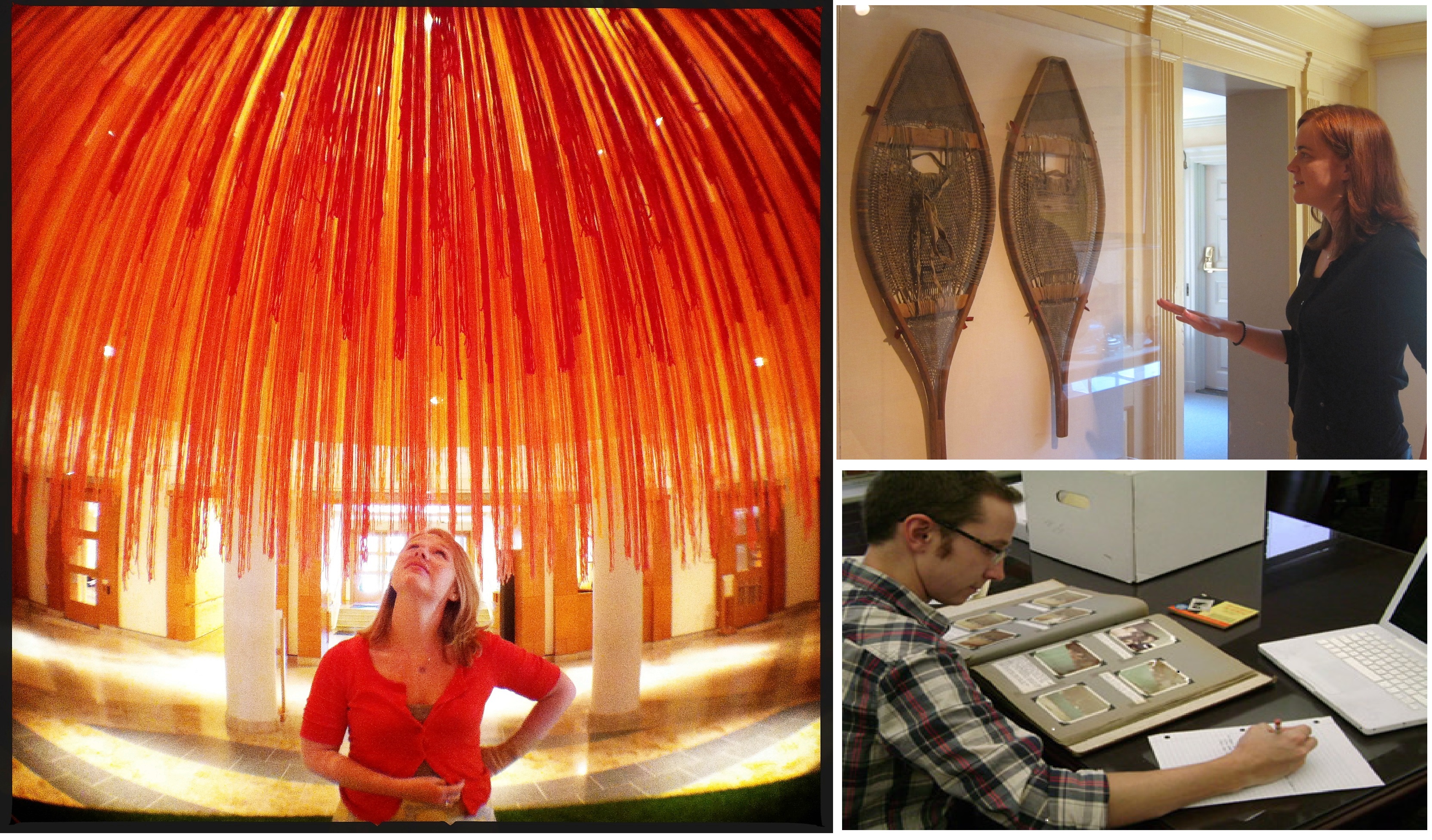
History Department Masters Theses Collection
Theses from 2024 2024.
'Our Sacred Rights': The Southern Baptist Convention and the Rhetoric of Oppression, 1845 and Present Day , Katlyn Durand, History

Theses from 2023 2023
Memories of Hope and Loss: “kerhi maa ne bhagat singh jameya” , Sheher Bano, History
Quṭb al‐Dīn al‐Shīrāzī and His Political, Religious, and Intellectual Networks , Carina Dreyer, History
Imagining the “Day of Reckoning”: American Jewish Performance Activism during the Holocaust , Maya C. Gonzalez, History
Cut Out of Place: The Geography and Legacy of Otto Ege's Broken Books , Melanie R. Meadors, History
Theses from 2022 2022
Heavy Metal in Medieval Europe , Sean M. Klimmek, History
Historic Houses and the Food Movement: Casey Farm and Coastal Growers' Market , Allison L. Smith, History
Theses from 2021 2021
“A Constant Surveillance”: The New York State Police and the Student Peace Movement, 1965-1973 , Seth Kershner, History
Theses from 2020 2020
Our Souls are Already Cared For: Indigenous Reactions to Religious Colonialism in Seventeenth-Century New England, New France, and New Mexico , Gail Coughlin, History
The Art of Not Seeing: The Immigration and Naturalization Service’s Failed Search for Nazi Collaborators in the United States, 1945-1979 , Jeffrey Davis, History
Treating the Revolution: Health Care and Solidarity in El Salvador and Nicaragua in the 1980s , Brittany McWilliams, History
Theses from 2019 2019
Interpreting Access: A History of Accessibility and Disability Representations in the National Park Service , Perri Meldon, History
“Nothing Material Occurred”: The Maritime Captures That Caused Then Outlasted the United States’ Quasi War with France , Emma Zeig, History
Unsettling East Jersey: Borders of Violence in the Proprietary Era, 1666-1719 , Amelia Zurcher, History
Theses from 2018 2018
Wanderers of Empire: The Tropical Tramp in Latin America, 1870-1930 , Jack Werner, History
Theses from 2017 2017
The Economy of Evangelism in the Colonial American South , Julia Carroll, History
Springing Forth Anew: Progress, Preservation, and Park-Building at Roger Williams National Memorial , Sara E. Patton, History
Conformity and Digression: Change of Narrative in a Chinese Peasant's Personal Writing , Danping Wang, History
Theses from 2016 2016
"The Fate Which Takes Us:" Benjamin F. Beall and Jefferson County, (West) Virginia in the Civil War Era , Matthew Coletti, History
Theses from 2015 2015
Araguaia: Maoist Uprising and Military Counterinsurgency in the Brazilian Amazon, 1967-1975 , Thamyris F. T. Almeida, History
"Who's Hiring the Indochinese Worker? Your Competition, Probably": Work, Welfare Dependency, and Southeast Asian Refugee Resettlement in Lowell, Massachusetts, 1975-1985 , Janelle Bourgeois, History
AN EERIE JUNGLE FILLED WITH DRAGONFLIES, SNIPER BULLETS AND GHOSTS: CHANGING PERCEPTIONS OF VIETNAM AND THE VIETNAMESE THROUGH THE EYES OF AMERICAN TROOPS , Matthew M. Herrera, History
Combating Slavery and Colonization: Student Abolitionism and the Politics of Antislavery in Higher Education, 1833-1841 , Michael E. Jirik, History
Theses from 2014 2014
Against The Odds: Accounting For The Survival Of The Berkshire Athenaeum , John Dickson, History
Motives of Humanity: Saint-Domingan Refugees and the Limits of Sympathetic Ideology in Philadelphia , Jonathan Earl Dusenbury, History
The City of Minas: The Founding of Belo Horizonte, Brazil and Modernity in the First Republic, 1889-1897 , Daniel Lee McDonald, History
Mishoonash in Southern New England: Construction and Use of Dugout Canoes in a Multicultural Context , Jacob M. Orcutt, History
The Politics of Psychiatric Experience , Shuko Tamao, History
Commodore Perry's Expedition, 1852-4: Layered Experiences and Perceptions of the U.S., Japan, and the Kingdom of Ryukyu , Erika Tomoyose, History
Theses from 2013 2013
The Regional Influences on Religious Thought and Practice: A Case Study in Mormonism’s Dietary Reforms , Samuel Alonzo Dodge, History
Henry Thoreau's Debt to Society: A Micro Literary History , Laura J. Dwiggins, History
Colonial Role Models: The Influence of British and Afrikaner Relations on German South-West African Treatment of African Peoples , Natalie J. Geeza, History
From Main to High: Consumers, Class, and the Spatial Reorientation of an Industrial City , Jonathan Haeber, History
The Terrorist Doppelganger: Somoza and the Sandinistas , Thomas A. Hohenstein, History
The Third Reich in East German Film: Defa, Memory, and the Foundational Narrative of the German Democratic Republic , Jaimie Kicklighter, History
Nationalism and the Public Sphere: Tracing the Development of Nineteenth-Century Latin American Identities , Lisa Ponce, History
Theses from 2012 2012
Citizens and Criminals: Mass Incarceration, "Prison Neighbors," and Fear-Based Organizing in 1980s Rural Pennsylvania , Erika Arthur, History
The Praxis of Horst Hoheisel: the Countermonument in an Expanded Field , Juan Felipe Hernandez, History
Si Se Puede: The United Farm Workers, Civil Rights, and the Struggle for Justice in the Fields , Roneva C. Keel, History
Good News , Eesha Williams, History
Theses from 2011 2011
"Super Successful People": Robert Schuller, Suburban Exclusion, and the Demise of the New Deal Political Order , Richard Anderson, History
SCAR'd Times: Maine's Prisoners' Rights Movement, 1971-1976 , Daniel S. Chard, History
Intellectuals and Local Reforms in Late Qing Wuxi: 1897-1904 , Lei Duan, History
An End to the “Vichy/Algeria Syndrome”?: Negotiating Traumatic Pasts in the French Republic , Justin W. Silvestri, History
The Politics of Labor Militancy in Minneapolis, 1934-1938 , Kristoffer Smemo, History
Eugenothenics: The Literary Connection Between Domesticity and Eugenics , Caleb J. true, History
Theses from 2010 2010
"Flying is Changing Women!": Women Popularizers of Commercial Aviation and the Renegotiation of Traditional Gender and Technological Boundaries in the 1920s-30s , Emily K. Gibson, History
Bolivia's Coca Headache: The Agroyungas Program, Inflation, Campesinos, Coca and Capitalism In Bolivia , John D. Roberts, History
Theses from 2009 2009
For Love or Money: Labor Rights and Citizenship for Working Women of 1930s Oaxaca, Mexico , Sandra K. Haley, History
A New Vision of Local History Narrative: Writing History in Cummington, Massachusetts , Stephanie Pasternak, History
Drawing Defeat: Caricaturing War, Race, and Gender in Fin de Siglo Spain , Joel C. Webb, History
Theses from 2008 2008
Reconstructing Molly Welsh: Race, Memory and the Story of Benjamin Banneker's Grandmother , Sandra W. Perot, History
Theses from 2007 2007
"Somebody understood us" :: Nancy Macdonald and the Spanish Refugee Aid/ , Marta H. Healey, History
Abandoning nature :: European philosophy and the triumph of equal temperament/ , Noel David Hudson, History
American workers, American empire :: Morrison I. Swift, Boston, Massachusetts and the making of working-class imperial citizenship, 1890-1920/ , Justin Frederick Jackson, History
Men of the meanest sort :: military leadership and war in the New England colonies, 1690-1775/ , Seanegan P. Sculley, History
Theses from 2005 2005
"This place is not meant for recreation. It is meant for inspiration" :: the legacies of Clara Endicott Sears/ , Megan M. Kennedy, History
Theses from 2004 2004
Woodrow Wilson's conversion experience :: the President, the woman suffrage movement, and the extent of executive influence , Beth A. Behn, History
Hardball diplomacy and ping-pong politics: Cuban baseball, Chinese table tennis, and the diplomatic use of sport during the Cold War , Matthew J. Noyes, History
Theses from 2000 2000
John F. Kennedy, the development of counterinsurgency doctrine and American intervention in Laos, 1961-1963 , Daniel C. Koprowski, History
Theses from 1998 1998
Eadric Streona :: a critical biography/ , Terry Lee Locy, History
Theses from 1997 1997
Sectionalism and national consciousness in the early Republic :: the case of New England Federalists, 1800-1815/ , Denis A. Kozlov, History
Theses from 1996 1996
A stabilizing influence :: the "war of the dictionaries," 1848-1861/ , James F. Leach, History
I ain't got no home in this world anymore: sharecroppers, tenant farmers, and the Southern Tenant Farmer's Union , James D. Ross, History
Theses from 1995 1995
Marching through hell :: the British soldier in the First World War's East African campaign/ , Taylor Harper, History
The daughters of rural Massachusetts :: women and autonomy, 1800-1860/ , Glendyne R. Wergland, History
Theses from 1994 1994
Law and public life in thirteenth century Montpellier/ , Charles E. Bashaw, History
Into the hornet's nest :: how shall they hear without a preacher/ , Jean Sherlock, History
Theses from 1993 1993
The committees of correspondence, inspection and safety in old Hampshire County, Massachusetts, during the American Revolution/ , Carolyn D. Hertz, History
Theses from 1992 1992
The education of a field marshal :: Wellington in India and Iberia/ , David G. Cotter, History
"Webs of significance" :: Italian textile labor and the fabric of society, 1750-1850/ , Dorothy M. Dumont, History
Aspects in creating a gentleman :: education and the Grand Tour in eighteenth-century England/ , Lisa C. Mangiafico, History
Theses from 1991 1991
American Catholicism and the political origins of the Cold War/ , Thomas M. Moriarty, History
The ass worship controversy/ , Robert E. Ravens-seger, History
The development of local religious tolerance in Massachusetts Bay Colony/ , Andrew Leonard Sweet, History
Theses from 1990 1990
Bucking the tide :: Charles Phelps and the Vermont land grant controversies, 1750-1789/ , Peter E. Dow, History
Populism and the Guatemalan revolution :: politics and power in transition, May 1944-March 1945/ , Todd R. Little, History
Theses from 1988 1988
Very special circumstances :: women's colleges and women's friendships at the turn of the century/ , Rosalind S. Cuomo, History
Charlemagne and kingship :: the responsibility of absolute power/ , Jane Swotchak Ourand, History
Chinese political movements and historiography on American history/ , Wenjun Xing, History
Theses from 1984 1984
The distorting image : women and advertising, 1900-1960/ , Judith A. Freeman, History
Amherst soldiers in the American Revolution/ , Martha N. Noblick, History
Theses from 1983 1983
Genealogy and social history :: the early settlement of Lebanon, Connecticutt, as a case study. , Robert Charles Anderson, History
Theses from 1982 1982
Morphology of the 1980 Massachusetts business elite. , David P. Perlman, History
Theses from 1981 1981
The way that good folks do: Junior Achievement and corporate culture. , Edwin Gabler, History
Theses from 1978 1978
Lindomania or the Penny Press observed :: a study of the 1850 New York press in action. , Janet Lehrman Brown, History
Signal: a study in Geman propaganda of the Second World War. , Jeffrey Alan Hanson, History
Theses from 1977 1977
The status of West Indian immigrants in Panama from 1850-1941. , Sadith Esther Paz B., History
The Peace of Nicias/ , Milo Milton Williams, History
Theses from 1976 1976
The British War Office ;: from the Crimean War to Cardwell, 1855-1868. , Paul H. Harpin, History
The Santa Cruz strikes: a case study in labor relations in the Yrigoyen era/ , Robert Nelson Landback, History
An examination of the laws of William the Conqueror. , Steven D. Sargent, History
Farmer's daughter, innkeeper's daughter, minister's daughter ;: young women of the early republic. , Thomas Paul Smith, History
Theses from 1975 1975
Aufbau-Reconstruction and the Americanization of German-Jewish immigrants 1934-1944. , Dorothee Schneider, History
Theses from 1974 1974
Anglo-American blood sports, 1776-1889: a study of changing morals. , Jack William Berryman, History
Theses from 1973 1973
Between a crown and a gibbet: Benjamin F. Butler and the early war years. , David M. Nellis, History
Theses from 1972 1972
Imperial looting and the case of Benin. , Mary Lou Ratté, History
Theses from 1971 1971
The attitudes of the American business community to the Soviet Union, 1917-1933. , Patricia J. Behenna, History
Religious conversion in Tlaxcala, 1520-1550. , Edmund C. Hands, History
The early career of Pliny Earle: A founder of American Psychiatry , Constance M. Mcgovern, History
Advanced Search
- Notify me via email or RSS
- Collections
- Disciplines
Author Corner
- Login for Faculty Authors
- Faculty Author Gallery
- Expert Gallery
- University Libraries
- History Website
- UMass Amherst
This page is sponsored by the University Libraries.
© 2009 University of Massachusetts Amherst • Site Policies
Privacy Copyright
ScholarWorks at UMass Boston
Home > CLA > HISTORY > HISTORY_THESES
History Masters Theses Collection
This collection contains open access and campus access Masters theses, made possible through Graduate Studies at the University of Massachusetts Boston. The full content of open access theses is available to all, although some files may have embargoes placed on them and will be made available as soon as possible. The full content of campus access theses is only available to those either on the UMass Boston campus or with a UMass Boston campus username and password. Click on the "Off-Campus UMass Boston Users" link on the record page to download Campus Access publications. Those not on campus and those without a UMass Boston campus username and password may gain access to this thesis through resources like Proquest Dissertations & Theses Global or through Interlibrary Loan.
Theses from 2023 2023
Margaret Cross Norton in Context: Norton’s Portrayal in American Archival Theory, the Social Conditions of Her Time and the Evolution of Presidential Libraries in the United States , Marie H. Bowen
Culture Wars: North Carolina, Representation, and the Vote on the Federal Constitution of 1787 , Maria A. Carlson
“Each Heart Alone Knoweth Its Own Bitterness”: The Jackson Family in Clarke County, Virginia, from Enslavement to Jim Crow , Melanie E. Garvey
Deconstructing Reconstruction: The Portrayal of The Reconstruction Era in High School History Textbooks , Eleanor Katari
Radical Routes: The Formation of the Boston School Bus Drivers Union Local 8751 , Maci Mark
Limitations & Liberation: Republican Motherhood and Female Advancement in Nineteenth Century America , Hannah Russell
The Armenian Genocide as Presented by the American Press , Grace A. Wargovich
Theses from 2022 2022
Northeastern Pennsylvania's Forgotten Labor Massacre: Analysis pf the English Language Record of the Lattimer Massacre , Jamie C. Costello
Shadow of the Vietnam War on the Senate Persian Gulf Debate of 1991 , Austin DiBari
Popular Memory, Silence, and Trust: A Mother and Son’s Relationship to School in the Shadow of the Prince Edward County Closures , Rory S. Dunn
The Arrows, The Shield: Mapping, Identity, and Tradition in Colonial Cempoala, Mexico , Savvas Papadopoulos
The Unsung Influence of the National Day of Mourning: A Study of Indigenous Activism, Race, and Memory , Erika T. Tauer
The Role of the Catholic Church’s Teachings on Slavery and Secession Affecting Allegiances During the American Civil War , David J. Thompson
Theses from 2021 2021
Celebrating Chinese American Veterans: Commemoration and America's Collective Memory Of War , Kevin Lee
Community in a Time of Crisis: How the People of Provincetown, Massachusetts Worked to Combat the HIV/AIDS Epidemic , Danielle Maria Lisbon
Uncommon Ground: Pawtucket-Pennacook Strategic Land Exchange in Native Spaces and Colonized Places of Essex County and Massachusetts Bay in the Seventeenth Century , Kristine Malpica
The Decline of the Massachusetts Know-Nothing Party: The Impact of Slavery and Temperance in 1855 , Alexander Rodrigues
The Boston Black United Front and Community-Centered Alternatives to the Carceral State , Joseph W. Sikowitz
Theses from 2020 2020
Operation Nickel Grass: Richard Nixon and the Yom Kippur War , Luke George Bergquist
Essential Labor: Marginalized People in the American Whaling Industry, Southeastern Massachusetts , Brielle E. Berical
A Dogged Resolve: The Doctrine and Decline of Mormon Plural Marriage, 1841-1890 , Jaclyn Thornock Gadd
The Hyde Park Thought Club: Pioneers in the Women’s Club Movement -- A Case Study 1868 – 1902 , Patrice A. Gattozzi
The Ghosts of Empires Past: The Red Army Faction’s Violent Relationship with Cold War Neo-Imperialism, 1969-1974 , Renee Danielle Jean
Reassessing the Factors that Led to the Evacuation of Japanese in World War Two , Mark S. Lewis
Black Masters; The Ownership of Slaves by Free People of Color in the Antebellum South 1780-1861 , Michael O. Magbagbeola
"To Have and Enjoy": Seating in Boston's Early Anglican Churches, 1686-1732 , Erica Jill McAvoy
Scholars, Spinners and Economies of Scale: Public Education on Exhibit in the Textile Era in New Bedford, Massachusetts , Arthur P. Motta Jr.
Beyond the Big Top: The Legacy of John Ringling and the American Circus , Casey L. Nemec
“Even if it Means Our Battles to Date are Meaningless” The Anime Gundam Wing and Postwar History, Memory, and Identity in Japan , Genevieve R. Peterson
"Full of Light and Fire": John Brown in Springfield , Louis J. Rocco Jr.
The Psychogram , Nathaniel M. Sullivan
Washed Away: Native American Representation in Oklahoma Museums and High Schools, 2000 – 2020 , Catherine E. Thompson
Theses from 2019 2019
Revelation and Concealment; The Words and World of Omar ibn Said , David Gabriel Babaian
Anabasis Aquilonos: The Interplay of Exemplarity and Scientific Historiography in B.H. Liddell Hart’s A Greater than Napoleon: Scipio Africanus , Daniel T. Barbre
The Language of the Herodians: An Analysis of Herodian Material Culture , Alexander J. D'Amore
Theses from 2018 2018
The Charge of Deserting Their Sphere: The Boston Female Anti-Slavery Society and Women’s Place in the Abolitionist Movement , Megan Irene Brady
Competing Goals: The Boston Teachers Union and the Boston Busing Crisis , Matthew R. Clark
"The Right to Play" The Establishment of Playgrounds in the American City , Kyle James Fritch
Good Girls Gone Bad: Interpreting the White Slavery Scare As A Response To Changing Women's Roles in the Progressive Era , Rachael Gorski
Innocent Victors: Atomic Identity at the American Museum of Science and Energy in Oak Ridge, Tennessee , Kathryn Leann Harris
William Monroe Trotter and His Contributions to the Early Civil Rights Movement , Katherine N. Jahl
Lapidary Medicine in Early Modern Spain , Dana L. Marquis
A Seemingly Insurmountable Problem: Carl Stokes and the Failure of Cleveland Now! , David M. Rainey
The Creation of the OSS And Anglo American Intelligence Co-Operation In Yugoslavia: A Case Study In Diverging Agendas , Christopher J. Royack
Luis V. Manrara & the Truth About Cuba Committee, Inc.: A Microhistory on the Effect of Socio-Economic Advantages and Politics on Early Cuban Acculturation within American Society , Francis E. Tansey
“Wicked and Illegal Traffic”: Newspaper Portrayal of Nigerian Women in the Cannabis Trade (circa 1970 – 1980) , Edet A. Thomas
Theses from 2017 2017
Mendez V. Westminister (1945): A Case that Brought Race to Center Stage , Samantha R. Albert
A Light in the Darkness: Constructing a View of Victorian Gynecological Surgery through Examination of Medical Treatises , Mandy M. Jimenez
Riot and Resurgence: The Antebellum African American Community of Providence, Rhode Island , Christopher J. Martin
Reverend James D. Eaton and Congregationalist Missionary Education in Revolutionary Mexico , Lucas A. Mihalich
Indian, Black, Mustee, and Music: Race, Identity, and Culture in Native Communities During the Age of Whaling , Tara M. Munro
Expendable: Eight Soldiers From Massachusetts Regiments Executed For Desertion During the United States Civil War , Stephen F. Ragon
Theses from 2016 2016
Exploring Reconstruction in the Territory of New Mexico , Krystle Eugley Beaubrun
'For the Sake of the Salvation of our Souls': An Analysis of Hildegard of Bingen's Authority and Reformist Theology in Relation to the Founding of Mount St. Rupert , Alexandra G. Borkowski
Rebuilding the City on a Hill: The Currents of New England Sectionalism and Liberal Christianity in Garrisonian Abolitionism , Zachary Boutin
'For the Benefit of Mankind': Franklin Roosevelt's Development of Trusteeship for the Postwar World , Tasnin R. Chowdhury
Run Aground: Cultural Transformation in Southeastern Massachusetts' Aquatic Spaces, 1637-1711 , Jonathan Dennis Green
In Freedom's Cause: An Exploration of Suffragette and Chartist Militancy in Britain , Ashley Kennedy-MacDougall
Countdown to Martial Law: The U.S-Philippine Relationship, 1969-1972 , Joven G. Maranan
He was a Camera: Christopher Isherwood, Weimar Germany, and Transationalism in the American Gay Rights Movement , Kristof R. Nelson
Somewhere Between Exploitation and Partnership: English and Native Alliances Surrounding the Raids on Deerfield and King William’s War , Caitlyn J. Remmes
The Barbadoes Family and the Pursuit of African-American Equality in 19th Century America , Robert J. Shaw
Theses from 2015 2015
Traitor or Pioneer: John Brown Russwurm and the African Colonization Movement , Brian J. Barker
A Queen's Legacy: The Lives of Elizabeth Woodville and Jacquetta of Luxembourg , Heather E. Bump
We're Just Like You: Strategies of Gay Activism against the Religious Right, Politics and Conservatism, and the AIDS Crisis , William G. Burton
Gay Outlaws: The Alpine County Project Reconsidered , Jacob D. Carter
George Loney Wallace and the Wrentham State School: 1906-1930 , Lindsay Fulton
Charles Francis Adams: A Study on the Crucial Role of Adams in Maintaining British Neutrality During the American Civil War , Jonathan S. McIsaac
The Massachusetts Bay Circuit , Corey W. Medeiros
É Para Sair de Portugal a Todos os Custos! The Policia Repressiva de Emigração Clandestina (1896-1911) and the Politics of Azorean Emigration to the United States , Sonia Patricia da Silva Pacheco
The Integration of African Americans in the Civilian Conservation Corps in Massachusetts , Caitlin E. Pinkham
Anti-Catholicism and Gender Norms: Reassessing the Charlestown Convent Riot, 1834 , Daniel S. Sousa
Theses from 2014 2014
Crowning a Florentine Princeps in a New Rome: The Civic Humanism of Leonardo Bruni and the Rise of Cosimo de' Medici, "Pater Patriae" , Jason F. Amato
The Transvaal Constitution and Responsible Government: How Churchill influenced Apartheid , Christopher H. Beckvold
"Tenacious of Their Lands": Fortifying the District of Mashpee, 1834-1842 , Nicole Alexis Breault
Assent and You Are Sane: "John Brown Was Right" , Jermain S. Corbin
Saving the "Original Paradise": Health Tourism, Tropical Disease, and the Problem of Cuba in the American Imperial Imagination, 1848-98 , Liana DeMarco
Panthersprung: The Vital Inheritance of the Agadir Crisis , Patrick E. Doerr
Lusitania: An Examination of Captaincy and Seamanship in the Face of Disaster , Robert J. Goulding
“So Succeeded by a Kind Providence”: Communities of Color in Eighteenth Century Boston , Eric M. Hanson Plass
Constructing A Vernacular Narrative: Communal Memory of Boston's West End , Eleanor Martinez Proctor
Theses from 2013 2013
Generations Apart: Cultural Revolution Memory and China's Post-80's Generation on the Chinese Internet , Vincent R. Capone
Once Lords and Emperors: Chivalry and the Making of Clerical Masculinity in High Medieval Normandy , Charles S. Carroll
Fort Devens: Civil Rights Unrest and African-American Identity in a Northern Military Camp during World War I and World War II , Janine Hubai
The Hidden Experience: Untold Stories of Immigrant Agency During the Settlement House Movement in Boston , Deirdre L. Kutt
General Von Seeckt and Sino-German Cooperation , Yue Lan
"Our Brothers In This Country": Captivity and Kinship in the Colonial Northeast , Steven C. Moore
The Teacher Revolt: Militancy, Grassroots Mobilization, and Local Autonomy in the National Education Association and the Massachusetts Teachers Association (1960-1980) , Jamie A. Rinaldi
Germs, Pigs and Silver: King Philip's War and the Deconstruction of the Middle Ground In New England , Benjamin M. Roine
Men of Uncommon Substance: Sailor Literature and American Identity in Antebellum America, 1805 - 1840 , Pete Sprayregen
Technology Transfer and Diffusion in the Context of Globalization: A Study of a Critical Decade in the Ottoman Empire through the Experiences of Henry Eckford, 1830-1840 , Gulumhan Huma Yildirim
Theses from 2012 2012
The Forgotten Children: The Educational Demographics of an Austrian Diocese 1848-1852 , Mathew Richard Boyeson
Gaetano Salvemini: A Lesson in Thought and Action , Michael Christopher DiClemente
The Cultural Assault on the Female Gender during the Weimar Years , Jaime Alexandra Gaudet
Immigrants as Americanizers: The Americanization Movement of the Early Twentieth Century , Alexis Claire Hanley
Union Army Doctrine: The Role of the Artillery During the Campaign for Vicksburg , Stephanie A. Peacock
Botticelli's La Primavera: Painting the Cosmos of Human Ideals , Leatha Eleni Tzioumis
Women Under National Socialism: The Case Study of Melita Maschmann , Lynda Maureen Willett
Theses from 2011 2011
Diplomatic and Military Objectives and Their Impact on Operation Olympic: The Invasion of Kyushu, Japan, November 1st, 1945 , John Joseph Favara
The Debate over Indian Removal in the 1830s , George William Goss
Advanced Search
- Notify me via email or RSS
- Collections
- Disciplines
Author Corner
- About ScholarWorks
- History Department
Home | About | FAQ | My Account | Accessibility Statement
Privacy Copyright
Featured Topics
Featured series.
A series of random questions answered by Harvard experts.
Explore the Gazette
Read the latest.
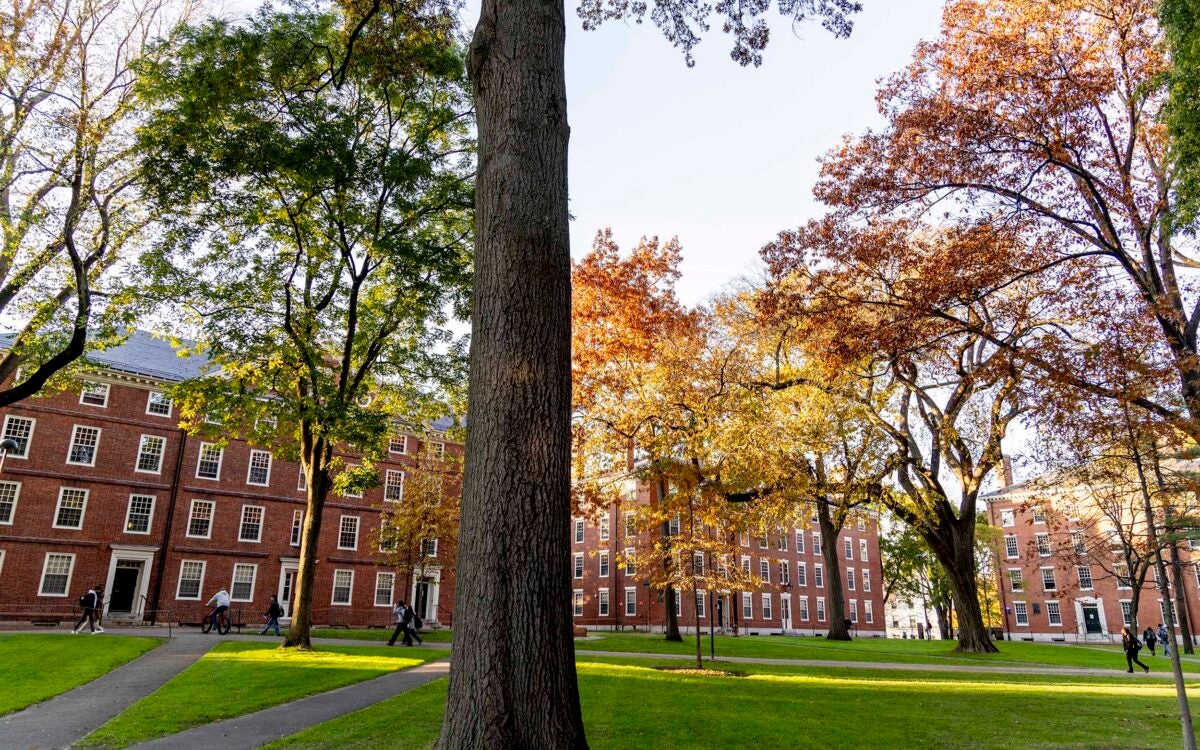
College accepts 1,937 to Class of 2028

Progress and challenges on the road to net zero
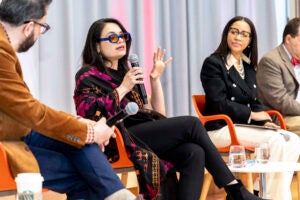
Pushing back on DEI ‘orthodoxy’
The stories behind the theses.

Photo illustration by Liz Zonarich/Harvard Staff
Eileen O’Grady, Christy DeSmith, Anne Manning
Harvard Staff Writers
Six students share their inspirations and outcomes
From African baobabs to virtual reality, here is a closer look at six thesis projects Harvard students undertook this year.
In the suburbs
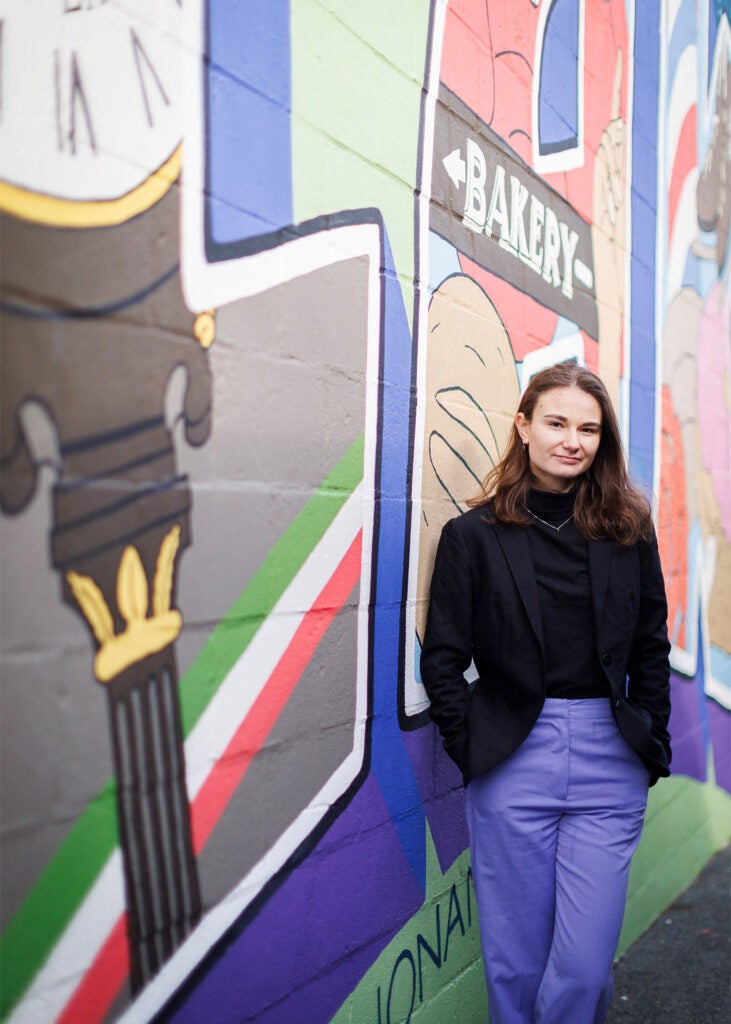
Madeline Ranalli is pictured alongside a mural promoting Nonantum, one of 13 villages within her hometown of Newton, Massachusetts.
Stephanie Mitchell/Harvard Staff Photographer
In leafy suburbs across the U.S., residents have rallied to block affordable housing from their neighborhoods.
“A lot of the resistance comes in the form of people saying, ‘Look what this development is going to do to the trees,’” noted Madeline Ranalli ’23.
The government concentrator (with a secondary in energy and environment ) used her senior thesis to examine how these communities wield environmentalism in opposition to multifamily residential developments.
“There’s this misconception that the more green you see, the more environmentally friendly a place is,” Ranalli explained. “But the way a community is designed can actually undermine the environmental benefits of those natural resources.”
The thesis analyzes four car-centric suburbs in California’s Bay Area, where the shortage of affordable housing is especially stark. The region is the birthplace of mainstream American environmentalism and has a history of resistance to multifamily housing. But it’s also a place where lawmakers are passing leading-edge legislation to bolster affordability and density.
Ranalli conducted dozens of in-person interviews, and worked with the Harvard Digital Lab for the Social Sciences to survey the nationwide frequency of using environmentalism to oppose land use that would actually reduce carbon footprints.
“This is by no means unique to California,” said Ranalli, who grew up observing similar rhetoric in her hometown of Newton, Massachusetts. “It’s very much a phenomenon in affluent, Democratic suburbs.”
While conducting research, Ranalli, now a legislative intern with the U.S. Senate Committee on Environment and Public Works, discovered “The Environmental Protection Hustle” (1979) by the late MIT urban planning professor Bernard J. Frieden , which helped inform her argument that environmentalism is more than an ideology about the importance of protecting natural resources.
“It’s also a very legitimate political strategy that can be employed very successfully to achieve certain ends,” Ranalli said.
Across the savannas
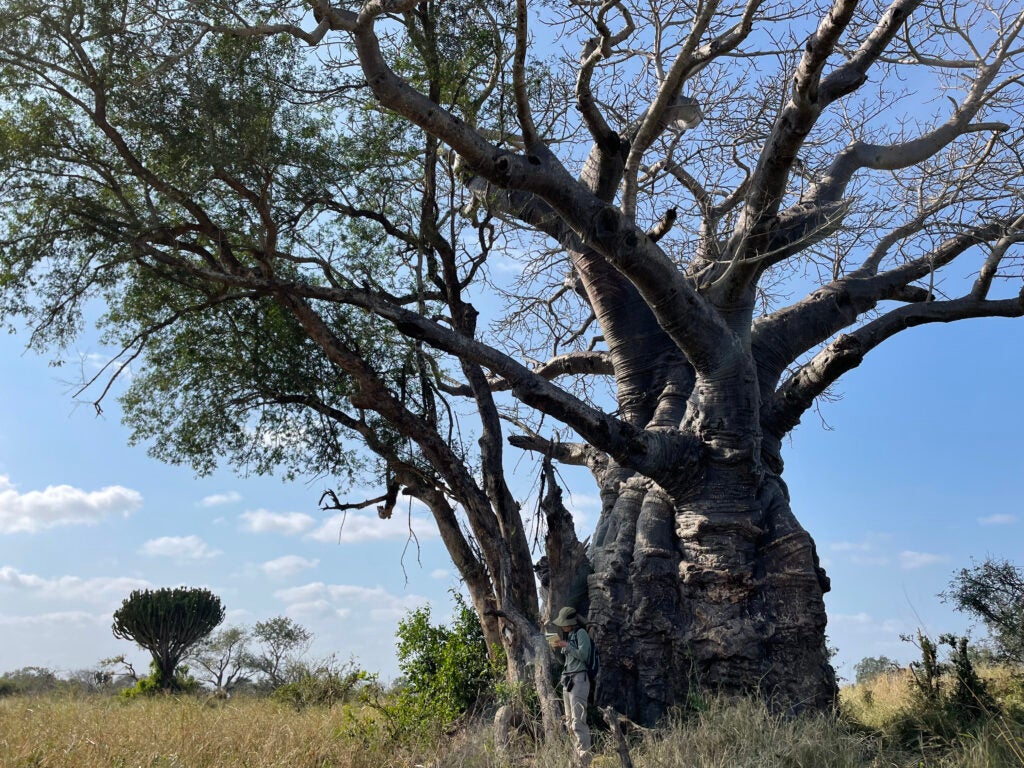
Audrey “Rey” Chin in Mozambique studying baobab trees.
Courtesy photo
Last summer, Audrey “Rey” Chin ’24 hiked 125 miles across dense savanna in Mozambique, painstakingly collecting data from more than 100 trees that make up a delicate, changing ecosystem.
An Environmental Science and Public Policy program concentrator, Chin wrote her senior thesis on the distribution and vulnerability of African baobabs, the largest fruit-bearing trees on the planet, which carry both ecological and cultural significance for the region. Elephants use these iconic trees as nutrient sources, stripping their bark, extracting water, and eating them. In doing so, they spread the seeds to help the trees reproduce.

Chin wrote her senior thesis on the distribution and vulnerability of African baobabs.
Chin’s thesis integrates her field study with remote sensing data to evaluate the extent to which landscape variables, including elephants, affect the health of baobabs. Chin is conducting the research in the lab of Andrew Davies , assistant professor of organismic and evolutionary biology.
“I think [the project] is ultimately about trying to find a way to balance the conservation priorities of the two species, and understand the interaction that’s happening,” she said.
The remote Karingani Game Reserve in southern Mozambique, where Chin and classmate/labmate Hannah Adler ’25 conducted the field work, is a test bed for understanding the current level of elephant utilization of the trees, and how that relationship could inform stewardship and conservation practices for years to come. The area came under official protection in 2017. Since then, migration from nearby Kruger National Park as well as anti-poaching and landscape restoration measures have led to a surge in the elephant population.
“The opportunity to witness the biodiversity and interconnectivity of different species was probably the most awe-inspiring part of the project,” Chin said.
In the workshop
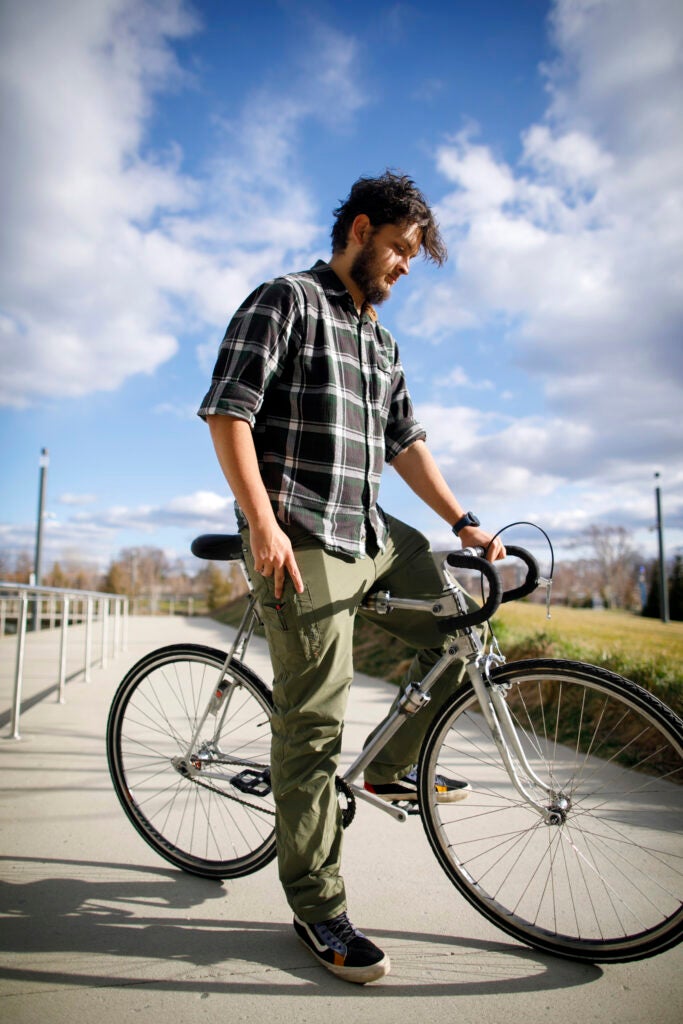
Francisco Marquez with his prototype bicycle.
Photos by Stephanie Mitchell/Harvard Staff Photographer
Francisco Marquez ’24 had always ridden bicycles, but it was pandemic-fueled restlessness during his freshman year that led the mechanical engineering concentrator to learn how to build them.
Now the de facto bike mechanic of his friend group, Marquez pursued a senior capstone project that tackled a perennial problem for two-wheeled enthusiasts like him: size.
“Because I’m a fairly large person, most bikes don’t fit me,” said Marquez, who is 6 foot 4. “I also have a bunch of friends who are very small, and they also can’t find a bike that really fits them. I decided to try to make a bike that could fit everybody.”
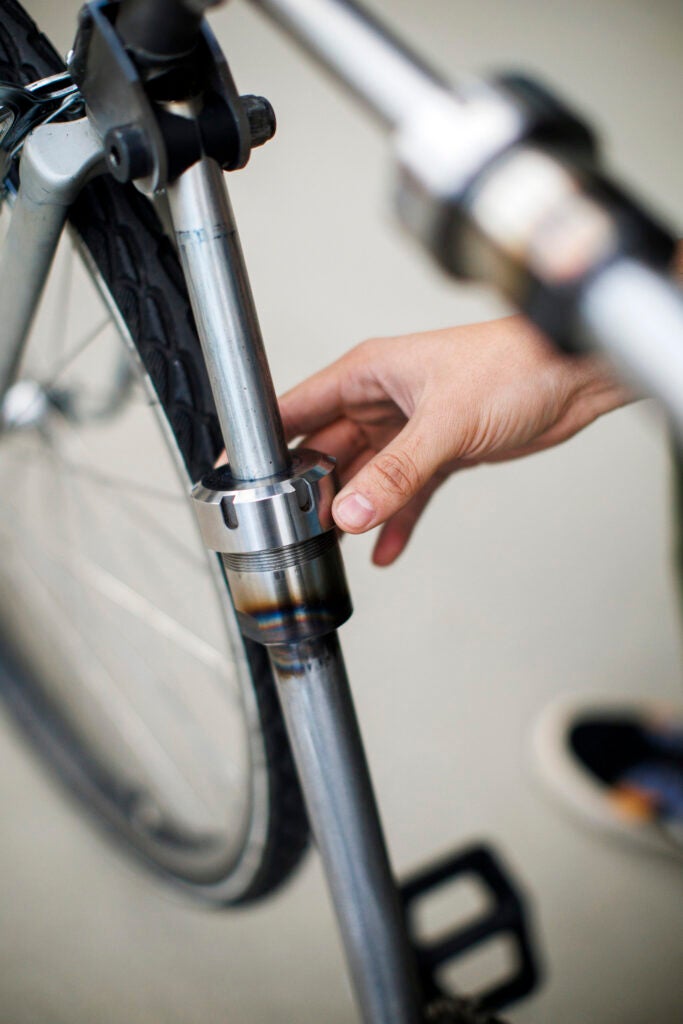
Marquez designed and built a modular bicycle frame with a shape and size that can be adjusted to fit very short people, very tall people, and everyone in between. It also allows children to grow into their wheels.
“It could even be something that you buy for a teenager, that they can then use as they grow into adulthood,” he said.
Simplifying the frame into standard components such as top tube, down tube, and fork, Marquez redesigned each piece with unlocking mechanisms using joints and pins, allowing for rotating, loosening, and retightening. Manufacturing was no simple task; it took a year’s worth of testing to find the right materials and configuration for a bike that could be adjusted easily yet remain reliably rigid during use. He settled upon a retrofit of a vintage steel-framed bicycle and created his own custom parts. Throughout the process, Marquez picked up skills like welding and spent many hours in the Science and Engineering Complex machine shop , working with tools like a lathe and a mill.
Testing it for the first time in its tallest configuration, Marquez smiled when it fit like a glove. He said it was gratifying to be able to see his own design come to life.
“I’ve never ridden a bike that feels like this,” he said.
In the gardens
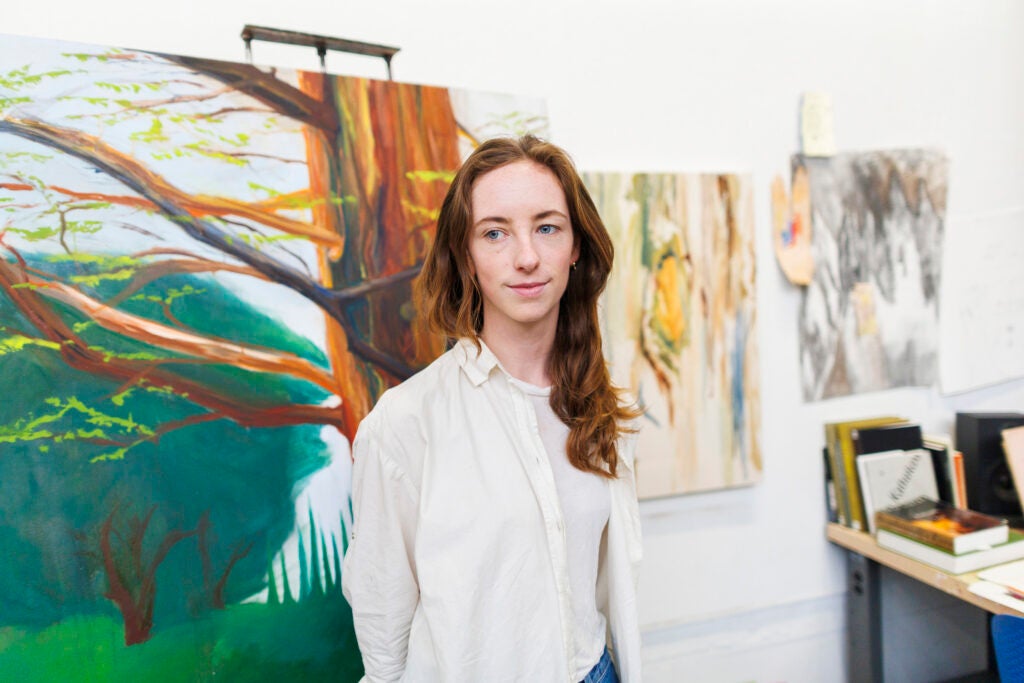
Rivers Sheehan in her studio space on Linden Street.
In the southern colonies of 18th-century America, the science of botany was used for economic purposes but also for aesthetics, using beautiful gardens and cultivated landscapes to mask a brutal plantation economy.
Rivers Sheehan ’23, a joint concentrator in art, film, and visual studies and history of science , completed a thesis project that combined historical research with an art exhibit, examining how botany, considered a gentlemanly European science in the 18th century, found new roots in the U.S.
“I looked at how that epistemology got applied in the South, in the frontier lands where people were both setting up really profitable and violent plantations using botanical knowledge and also setting up estate gardens that were inspired by French and English landscape design, often on the same properties,” said Sheehan, who wrote a 90-page paper detailing her findings.
For the art element, the December 2023 graduate created a multimedia exhibit of paintings, photographs, prints, and drawings inspired by her research at the plantations and also her own relationship to the natural world. Some of the pieces use paper dyed with natural indigo, birch bark, rabbit skin glue, leaves, and wild mushrooms. Sheehan worked in a variety of media, each representative of a different modality she learned during her time at Harvard.
“The studio project is a way of bringing this niche research into the contemporary moment and offering another way for an audience to come into it who isn’t necessarily an academic historian of science, which is the audience for the written part of it,” Sheehan explained.
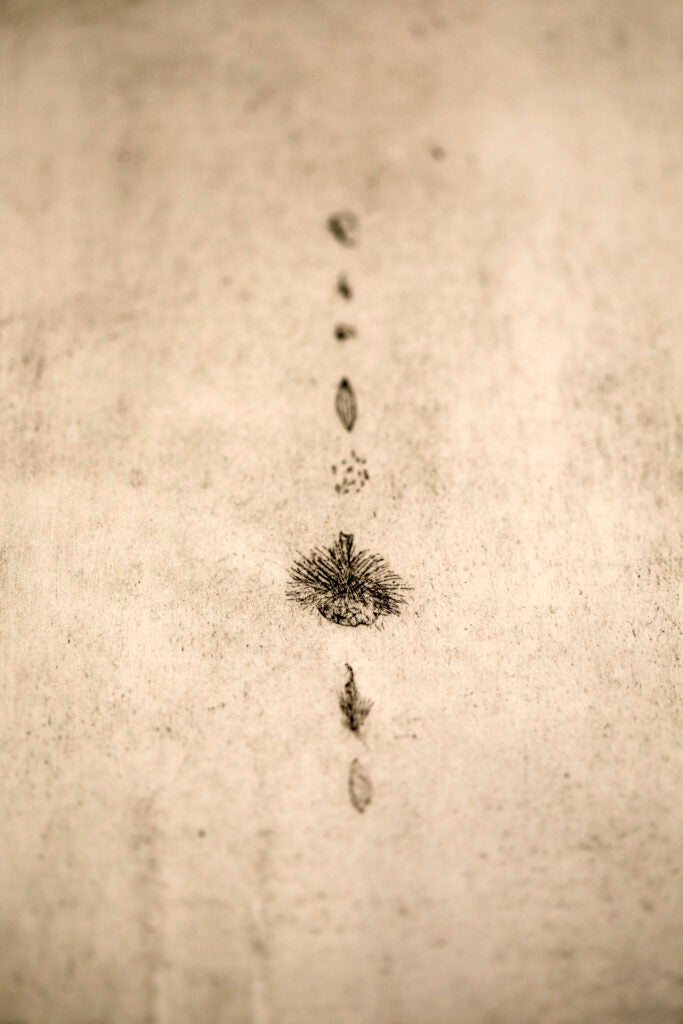
Stepping back in time
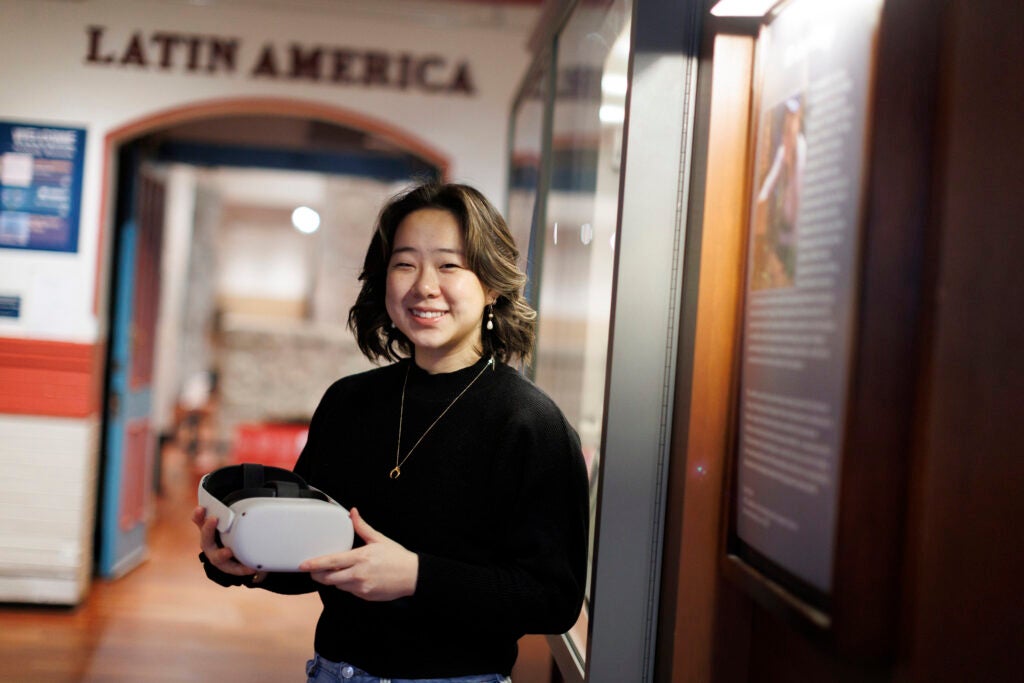
Cindy Tian created a virtual reality program.
Virtual reality can facilitate all manner of educational experiences — like bringing visitors inside the Pyramids of Giza . Cindy Tian ’23, a joint concentrator in computer science and archaeology , wondered how the technology would fare with more complicated lessons.
“I wanted to see if VR can show archaeological processes that are harder for the general public to understand,” she said. “Would the technology improve the transfer of information from archaeologists and museum staff?”
Her thesis took the form of an exhibit for the Peabody Museum of Archaeology and Ethnography , still on view near the third-floor stairwell. Tian first created a display featuring artifacts that illuminate flintknapping — or fashioning blades, points, and other tools from a stone core. On view are everything from hammerstones to chipping tools.

Tian, a December grad, also created a virtual reality program that allowed visitors to simulate making their own tools with objects like the ones on display.
“Flintknapping is a reductive process where you basically remove pieces of rock,” said Tian, who will soon start a full-time role with a music analytics startup. “It’s just one of the things where it’s better to learn by doing rather than reading or hearing someone talk about it.”
Finally, Tian tested who learned best about flintknapping — those who took in the exhibit, those who used the VR program, or those who encountered both.
“Are we integrating VR because it’s cool? Or is it actually helpful ?” she wondered.
Those who experienced both the exhibit and the VR scored highest on Tian’s post-visit content quiz. The same group emerged with more positive opinions of the flintknapping lesson.
“They essentially got to do it without doing it,” Tian said. “I found that the virtual reality is definitely beneficial for helping people learn about archaeological processes.”
Working in the studio
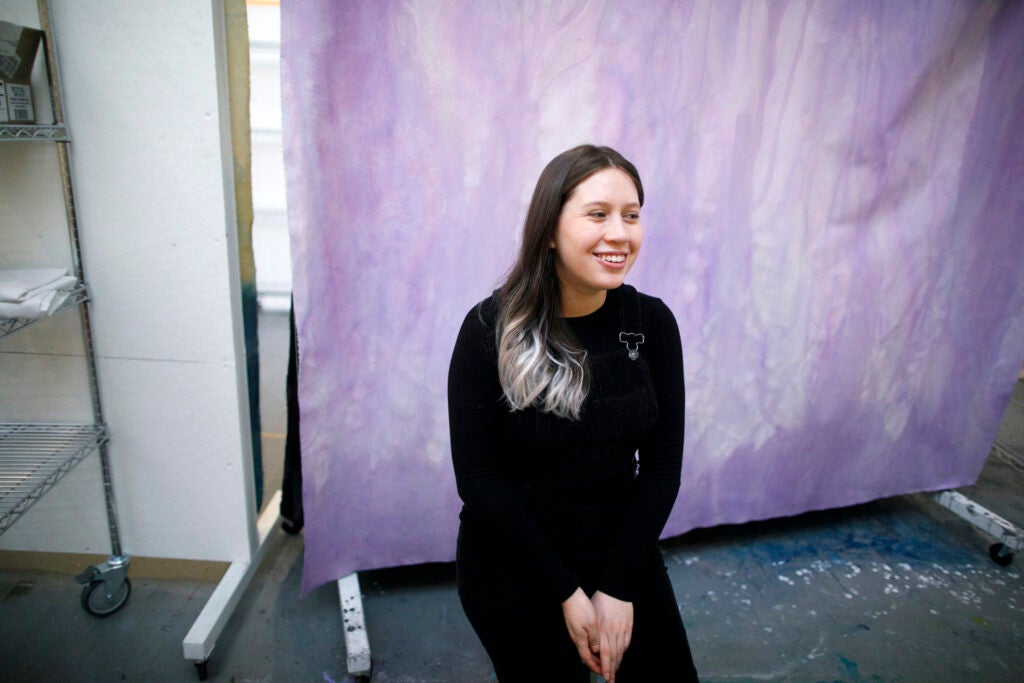
Five large abstract paintings are included in Isabel Haro’s thesis, which is titled “Taking Refuge.”
Abstract art has long served as a vessel for artists — think Hilma af Klint or Wassily Kandinsky — to explore religion and spirituality.
Isabel Haro ’24, a concentrator in art, film, and visual studies with a secondary in music , was inspired to pursue a thesis that explored this topic after taking the course “Spiritual Paths to Abstract Art” with Professor Ann Braude at Harvard Divinity School . Haro, who practices Buddhism, wanted to create a collection of work inspired by her own experiences.
“It’s very hard to talk about spirituality in the contemporary art world. It’s something that a lot of people are not interested in, or actively shy away from,” said Haro. “My intention was to be really diligent and responsible with how I was bringing Buddhism into the art conversation.”
To prepare, she studied other artists and paintings, read Buddhist scripture and poetry, meditated, and sketched. Inspired by color field style and the techniques of abstract painter Morris Louis, Haro played with gravity, standing on a stool to pour ink down the canvas, and laid canvas on the floor to let the paint move in rivulets.
The thesis, titled “Taking Refuge,” includes five large abstract paintings done in paint on muslin and canvas. One is painted with black Sumi ink — the kind used for Zen calligraphy — and uses salt and soap to create textures.
“I spent so much time preparing for this final set of paintings and all of that work prepared me to let these paintings emerge in a natural way,” Haro said. “I learned how valuable it is to work on a project over an extended period of time.”
Share this article

You might like
Students represent 94 countries, all 50 states

New reporting requirement for public companies ‘a meaningful step forward,’ says director of sustainable investing at HMC
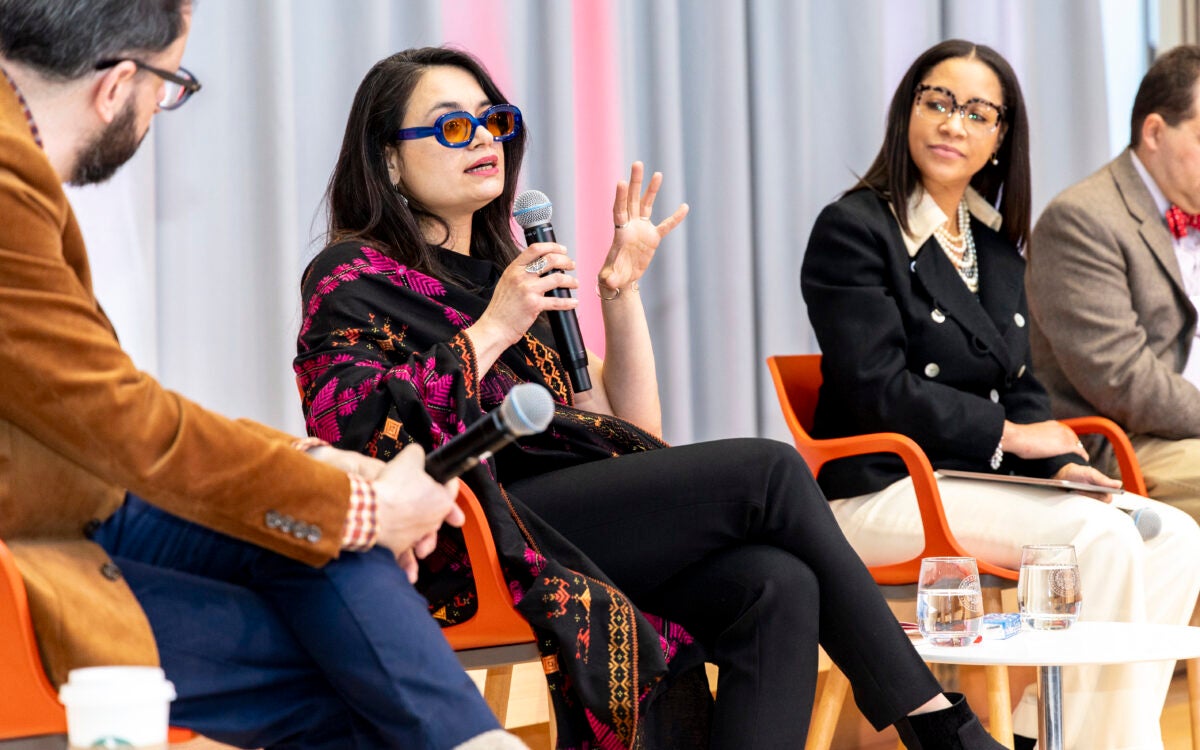
Panelists support diversity efforts but worry that current model is too narrow, denying institutions the benefit of other voices, ideas
Aspirin cuts liver fat in trial
10 percent reduction seen in small study of disease that affects up to a third of U.S. adults
- Accessibility Options:
- Skip to Content
- Skip to Search
- Skip to footer
- Office of Disability Services
- Request Assistance
- 305-284-2374
- High Contrast
- School of Architecture
- College of Arts and Sciences
- Miami Herbert Business School
- School of Communication
- School of Education and Human Development
- College of Engineering
- School of Law
- Rosenstiel School of Marine, Atmospheric, and Earth Science
- Miller School of Medicine
- Frost School of Music
- School of Nursing and Health Studies
- The Graduate School
- Division of Continuing and International Education
- People Search
- Class Search
- IT Help and Support
- Privacy Statement
- Student Life
University of Miami
- Division of University Communications
- Office of Media Relations
- Miller School of Medicine Communications
- Hurricane Sports
- UM Media Experts
- Emergency Preparedness
Explore Topics
- Latest Headlines
- Arts and Humanities
- People and Community
- All Topics A to Z
Related Links
- Subscribe to Daily Newsletter
- Special Reports
- Social Networks
- Publications
- For the Media
- Find University Experts
- News and Info
- People and Culture
- Benefits and Discounts
- More Life@TheU Topics
- About Life@the U
- Connect and Share
- Contact Life@theU
- Faculty and Staff Events
- Student Events
- TheU Creates (Arts and Culture Events)
- Undergraduate Students: Important Dates and Deadlines
- Submit an Event
- Miami Magazine
- Faculty Affairs
- Student Affairs
- More News Sites
April guide to the arts at the U
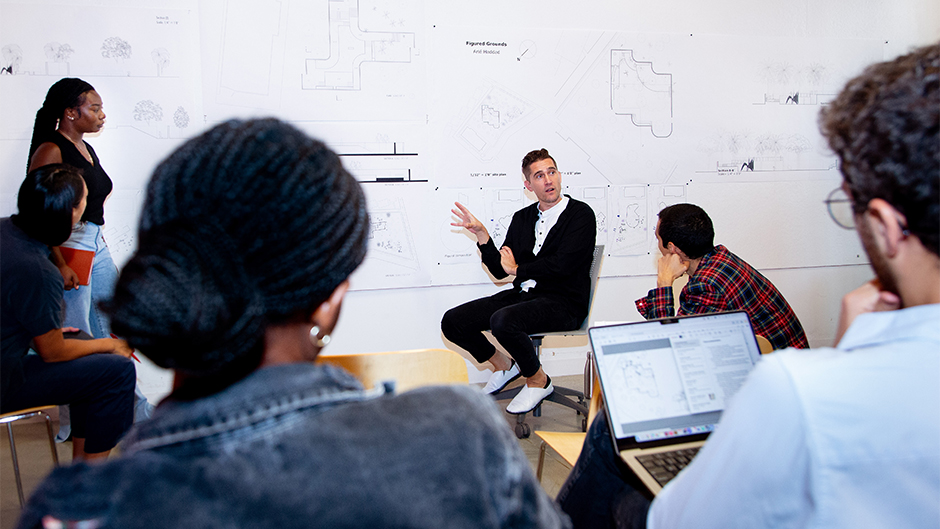
By Brittney Bomnin Garcia [email protected] 03-29-2024
Explore a roundup of events this month, including concerts, exhibitions, and undergraduate student presentations during the annual Research, Creativity, and Innovation Forum. Learn more about The U Creates —the University’s digital hub for the arts, culture, and creative expression—and view the full calendar of events .
VIEW ALL: Bill Cosford Cinema | Center for the Humanities | Jerry Herman Ring Theatre | Frost School of Music | Lowe Art Museum | School of Architecture | University Libraries | UM Art Galleries
Saturday, April 6, 7:30 p.m. | in person and streaming, purchase tickets
Frost Music Live!: Schubertiade for Violin and Piano
Frost School of Music’s piano professors will join renowned violinist Charles Castleman to unveil the magic of Franz Schubert. A tradition that began in 1815 honoring the then 18-year-old Schubert, the Schubertiade originated as an unpublicized, informal concert of his music, but quickly spread throughout Europe, and eventually to the United States. Purchase tickets .
Newman Recital Hall, Knight Center for Music Innovation, 5513 San Amaro Dr, Coral Gables, FL 33146
Monday, April 8, 6:30 p.m. | in person, free event
Book Talk: ‘Roman Satire’
With particular attention to authorial and national identity, artistic self-definition, and literary reception, Jennifer Ferriss-Hill, professor of classics and senior associate dean for faculty affairs and college diversity at the College of Arts and Sciences, shows how four ancient Latin poets—Lucilius, Horace, Persius, and Juvenal—asked and answered these questions between the second century BCE and the second century CE as they invented and reinvented the genre of Roman verse Satire. Save your seat .
Books & Books, 265 Aragon Ave., Coral Gables, FL 33134
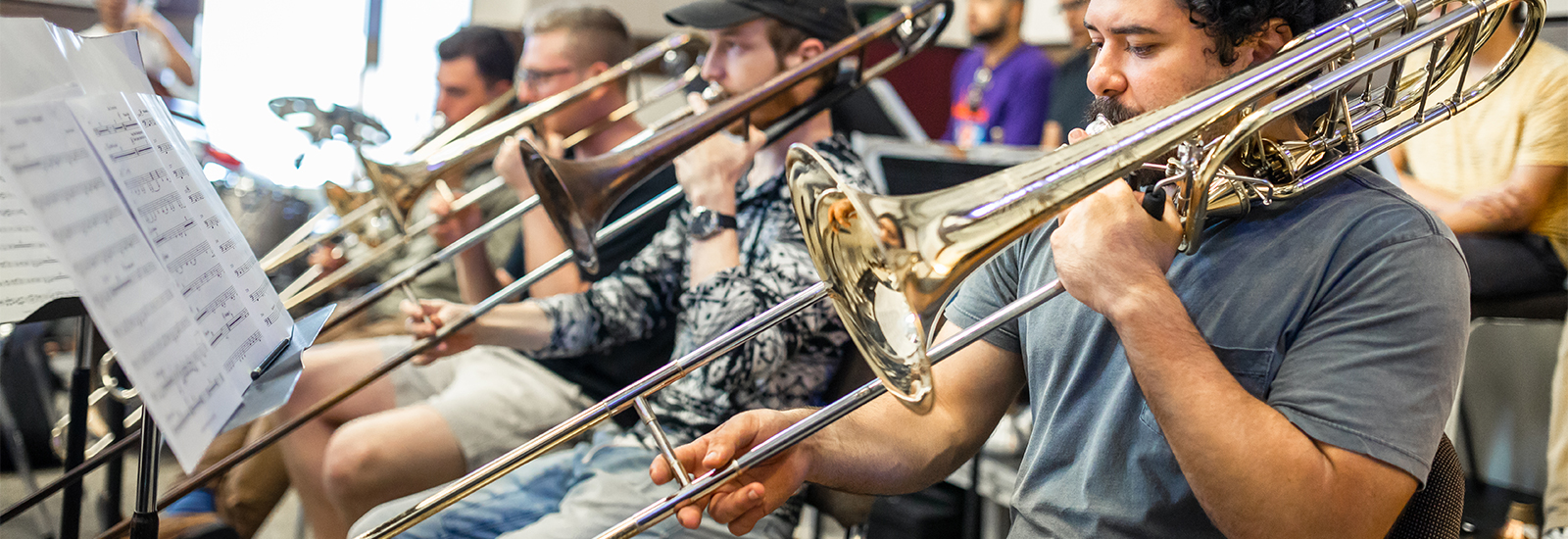
Tuesday, April 9, noon | virtual, free event
Slow Looking with the Lowe: Highlights from the Campus Art Collection
During this virtual program, Tola Porter, Lowe Art Museum educator for academic and public programs, will lead participants through a 30-minute mindful and interactive session exploring selected artworks from the Lowe’s collection. Sign up now .
Lowe Art Museum, 1301 Stanford Drive, Coral Gables, FL 33146
Wednesday, Apr. 10, noon to 4 p.m. | in person, free event
Research, Creativity, and Innovation Forum (RCIF)
The Office of Undergraduate Research and Community Outreach offers students from all disciplines the opportunity to present their research to a wide audience consisting of their peers, faculty and staff members, and the larger University community. In collaboration with the Center for the Humanities, RCIF has added a panel presentation component this year for students and peers to develop their presentation skills and further engage with their research in the humanities. Learn more .
Donna E. Shalala Student Center, 1330 Miller Drive, Miami, FL 33146
Thursday, April 11, 4 p.m. | in person, free event
Edith Bleich Lecture Series: Jennifer V. Evans, professor of history at Carleton University in Canada
In her lecture, “Why We Need Queer Kinship Now More Than Ever,” Evans asks how the queer and trans past has often been drawn upon to make a series of claims about liberal democracy itself, including the place of identity in rights-based discourses of experience, policy, and governance. Register now .
Otto G. Richter Library, Third Floor Conference Room, 1300 Memorial Drive, Coral Gables, FL 33146
Thursday and Friday, April 11–12 | in person, purchase tickets
Smart Cities MIAMI 2024
The School of Architecture, in collaboration with the Frost Institute for Data Science and Computing, will host the 8th Annual Smart Cities Conference . This event will explore the theme of artificial intelligence in design, offering a platform to delve into the cutting-edge advancements shaping the future of architecture. Registration is $50 per person.
Lakeside Village Expo Center, 1280 Stanford Drive, Coral Gables, FL 33146
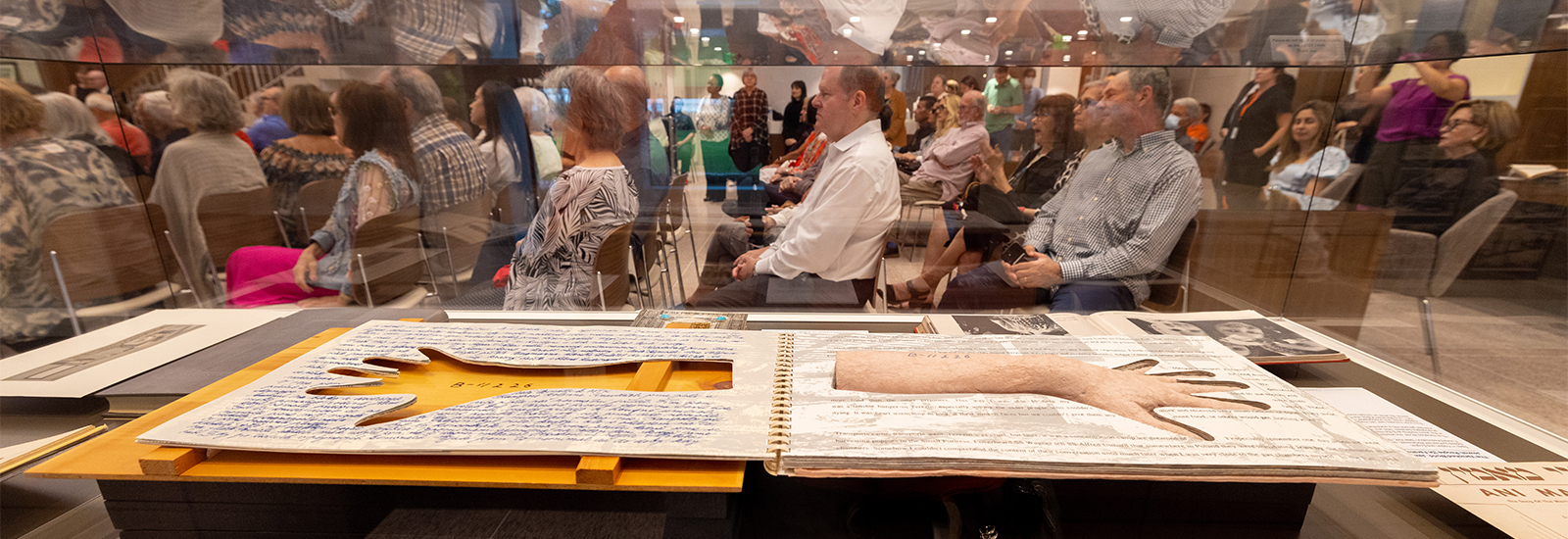
Saturday, April 13, 6 p.m. | in person, free event
M.F.A. in Creative Writing thesis reading
Graduate students Guillermo Leon, Dorie Spangler, and Swetha Siva, who are pursuing Master of Fine Arts in Creative Writing, will share their thesis. This event is open to the public.
Thursday April 17, 6 p.m. | in person, free event
Lowe Connects: Exploring Art, Marine Biology, and Engineering to Address Climate Challenges
U-Link partners from the departments of art and art history, marine biology, and engineering will speak about the connection between scientific research, engineering, and art. Guests will learn about the ways that the University of Miami is catalyzing interdisciplinary collaboration to advance knowledge on the impacts of climate change and other stressors, and the development of practical solutions to meet society’s changing needs. Register now .
Mindfulness programs are offered virtually at 4 p.m. on Wednesdays and in person at 10:30 a.m. on Thursdays at the Otto G. Richter Library.
Friday and Saturday, April 19-20 and Friday and Saturday, April 26-27 | in person, purchase tickets
‘Urinetown, the Musical’
Join the revolt in a dystopian future where water is worth its weight in gold, and one of the most basic human needs is under the control of an evil bureaucracy. Wickedly witty, this Tony Award- winning musical satire pokes fun at politics, social irresponsibility, capitalism, and musical theater itself. University students and staff and faculty members can use code THSUTOWN before selecting their seats to receive a discount. University students can obtain free entry to an 8 p.m. show Thursday, April 25, by presenting a valid ’Cane ID. Purchase tickets .
Jerry Herman Ring Theatre, 1312 Miller Drive, Coral Gables, FL 33146
Saturday, April 20, 6 p.m. | in person, free event
Catherine Kramer: ‘Known/Unknown’
On view from April 5 through April 26, the University community is invited to the opening reception of “Known/Unknown,” an exhibition by Master of Fine Arts candidate Catherine Kramer. Drawing inspiration from Swiss psychiatrist and psychoanalyst Carl Jung and his process of active imagination, Kramer intentionally works with subconsciously produced imagery while creating her artwork. Learn more .
University of Miami Wynwood Gallery, 2750 NW Third Ave., Suite 4, Miami, FL 33127
On view now through Saturday, April 20 | in person
The Annual Juried Exhibition
Organized by the Department of Art and Art History and hosted by the Lowe Art Museum, the exhibition features works of art across various media created by undergraduate and graduate students at the University of Miami. Learn more .
Monday, April 22, 4 p.m. | in person and streaming, free event
Adobe Scholars Reception
Meet and engage with the 2023-2024 Adobe Scholars as they share the results of their projects. This event is free to attend and open to the public. The online component of this hybrid event will be hosted using Zoom software. Sign up to participate .
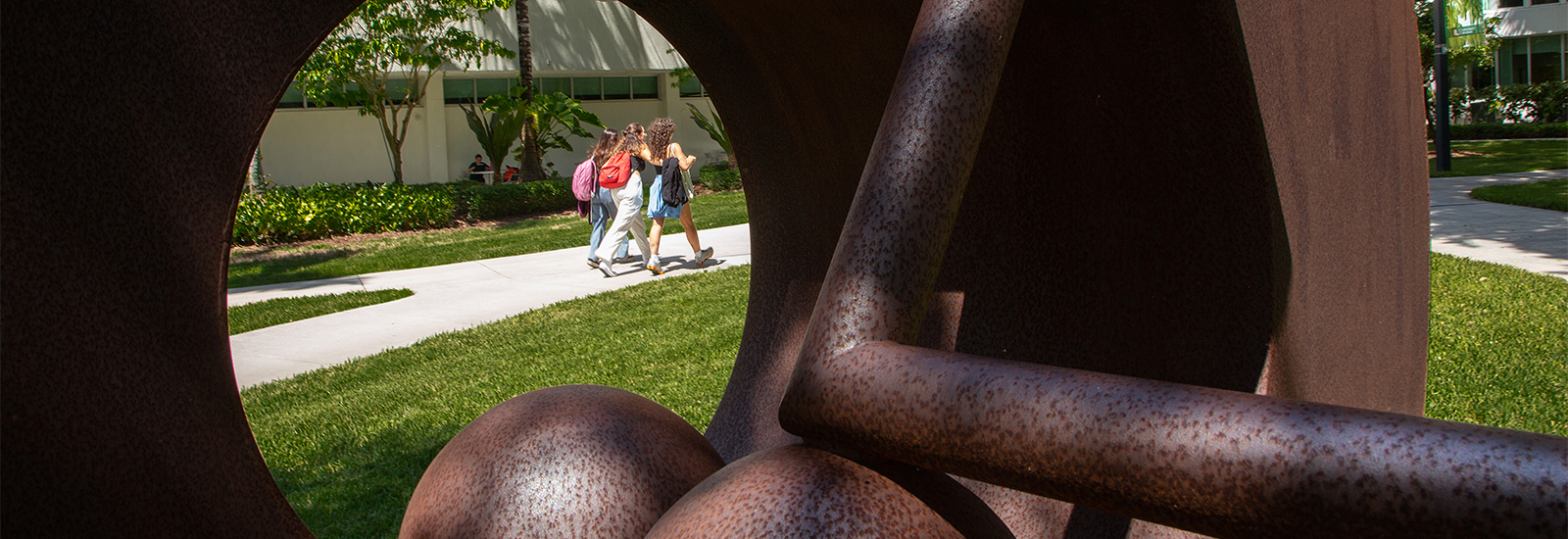
Monday, April 22, 7:30 p.m. | in person, free event
‘Sing Sing’
Attend a sneak preview of “Sing Sing,” the story of an inmate at the infamous Sing Sing Correctional Facility in Ossining, NY, who forms a theater troupe with his fellow prisoners. Admission is free. Registration is required .
Bill Cosford Cinema, Dooly Memorial 225, 5030 Brunson Drive, Coral Gables, FL 33146
Thursday April 25, 6 p.m. | in person, free event
ArtLab | Miya Ando: Sky Writing lecture and reception
Join the Lowe for a talk and reception featuring artist Miya Ando to celebrate the ArtLab 2024 exhibition, Miya Ando: Sky Writing, on view through Saturday, June 1. This student-curated exhibition features multimedia works by Miya Ando, whose oeuvre explores nature’s ever-changing moods and the fragility of human existence. Register to attend .
Thursday, April 25, 7:30 p.m. | in person and streaming, purchase tickets
Frost Music Live!: Michel Camilo and the Frost Latin Jazz Orchestra
Born in the Dominican Republic and raised in New York, Michel Camilo bridges the genres of jazz, classical, popular and world music with his artistry and virtuosity. The Grammy, Latin Grammy, and Emmy Award-winner joins forces for one night only with the Frost Latin Jazz Orchestra and Cuban drummer Dafnis Prieto. Purchase tickets .
Maurice Gusman Concert Hall, Frost School of Music, 1314 Miller Drive, Coral Gables, FL 33146
Saturday, April 27, 7:30 p.m. | in person and streaming, purchase tickets
Frost Music Live!: Beethoven’s 9th
The Frost Symphony Orchestra season finale presents a symphonic masterwork alongside four American orchestral miniatures by Augusta Reed Thomas, Bernard Rands, Daren Hagan, and Chen Yi. Purchase tickets .
Featured: RCIF Humanities Hub
As part of the Research, Creativity, and Innovation Forum, the Humanities Hub will feature representatives from the University's humanities departments to provide attendees with information about the humanities as well as answers to specific questions about fields of study, research pursuits, and career opportunities. The Humanities Hub aims to create a stronger connection between research and the humanities within the undergraduate student body and also promotes the different ways in which students can get involved in the humanities.

- Coral Gables , FL 33124
- 305-284-2211 305-284-2211
- UM News and Events
- Alumni & Friends
- University Hotline
Tools and Resources
- Academic Calendar
- Parking & Transportation
- social-facebook
- social-twitter
- social-youtube
- social-instagram
Copyright: 2024 University of Miami. All Rights Reserved. Emergency Information Privacy Statement & Legal Notices Title IX & Gender Equity Website Feedback
Individuals with disabilities who experience any technology-based barriers accessing the University’s websites or services can visit the Office of Workplace Equity and Inclusion .
Art & Art History
See saw seen: 2024 uic mfa thesis show reception.
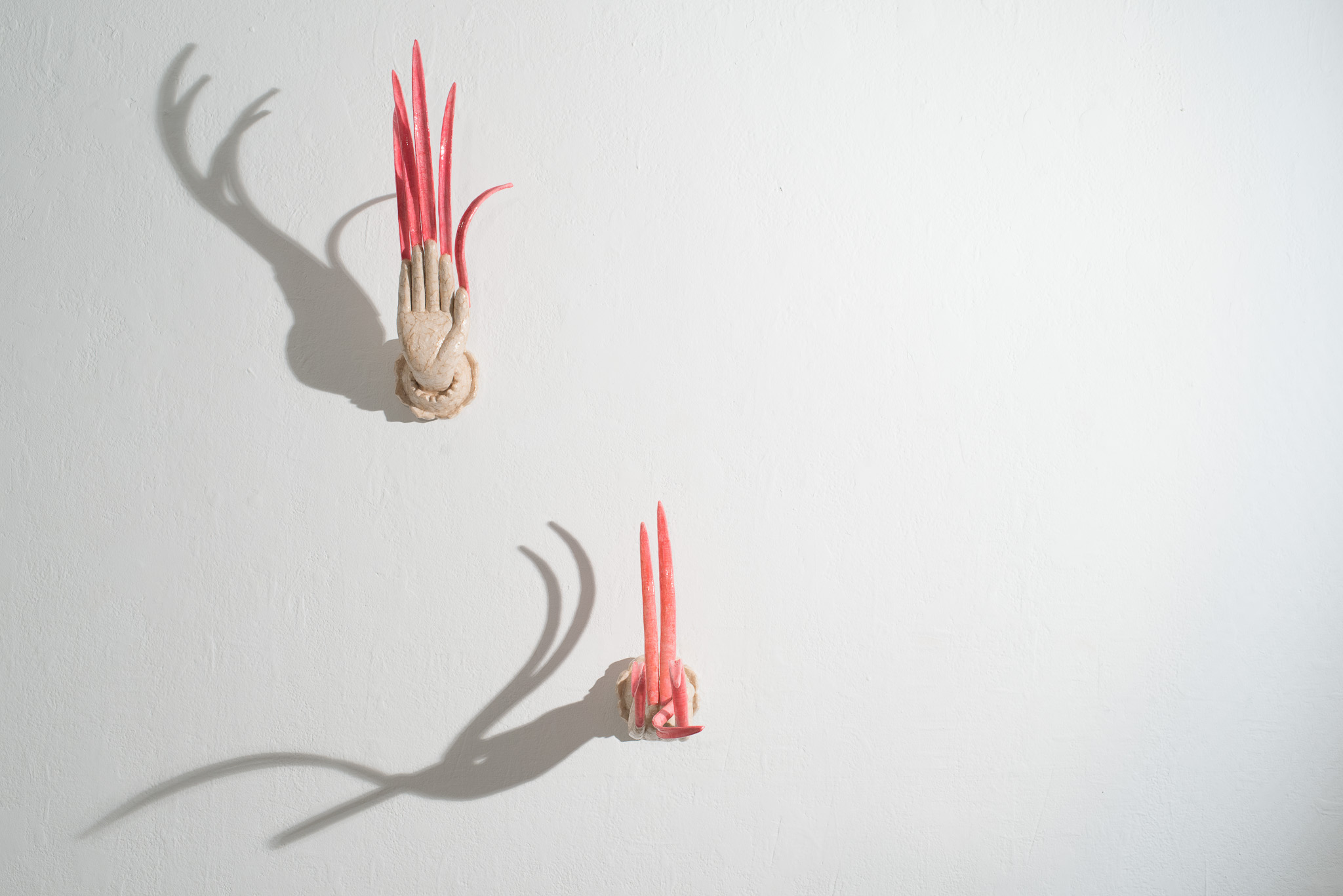
Le Hien Minh
Join us for the closing reception of See Saw Seen: 2024 UIC MFA Thesis Show . Cascading through layers of observation and perception, this 2024 MFA cohort reveals diverse artistic practices. The candidates probe educational theory as it applies to the art world, portraiture of the self and collective within the margins of a global society, reconnaissance in archives, the inherent qualities of materials and their relation to artistic social spheres, and communication in writing, philosophy, and visual culture. Through wide-ranging media, they assess whether the value of art is determined by the audience looking or through the artists’ independent views.
The UIC MFA Program facilitates an expansive reckoning for how creative practitioners exist at grassroots, academic, city, and global levels of the art world. It instigates introspection into how artwork functions to a broad audience, how it lives in each candidate’s niches, and how autonomous voices enhance personal relationships to art.
ACCESS INFORMATION : This program is free and open to the public. For questions and access accommodations, please check our Accessibility page or email [email protected] .
Related Art & Art History Events
- Art & Art History Learning Together: Art Education and Community
- Art & Art History The Mask of Prosperity

IMAGES
VIDEO
COMMENTS
Your thesis statement is one of the most important parts of your paper. It expresses your main argument succinctly and explains why your argument is historically significant. Think of your thesis as a promise you make to your reader about what your paper will argue. Then, spend the rest of your paper-each body paragraph-fulfilling that promise.
2. Develop a Thesis Statement. To create a thesis statement, a student should establish a specific idea or theory that makes the main point about a historical event. Scribbr, an editing website, recommends starting with a working thesis, asking the question the thesis intends to answer, and, then, writing the answer.
For history essays, most professors will expect to see a clearly discernible thesis sentence in the introduction. Note that many history papers also include a topic sentence, which clearly state what the paper is about. ... Bad thesis: The relationship between the American colonists and the British government changed after the French & Indian War.
A Thesis Helps You and Your Reader. Your blueprint for writing: Helps you determine your focus and clarify your ideas. Provides a "hook" on which you can "hang" your topic sentences. Can (and should) be revised as you further refine your evidence and arguments. New evidence often requires you to change your thesis.
the History Paper The Challenges of Writing About (a.k.a., Making) History At first glance, writing about history can seem like an overwhelming task. History's subject matter is immense, ... thesis will almost always appear in the opening paragraph(s) of a shorter essay or the opening section of a longer paper.
Director of Studies to write a thesis that exceeds 20,000 words. Typical theses run somewhere in the range of 15,000-20,000 words. • All candidates for an honors degree in History & Literature must prepare a senior thesis. Students who do not complete a thesis are not eligible to graduate with honors in History & Literature.
Crafting a good thesis is one of the most challenging parts of the writing process, so do not expect to perfect it on the first few tries. Successful writers revise their thesis statements again and again. A successful thesis statement: • makes a historical argument. • takes a position that requires defending. • is historically specific.
For history essays, most professors will expect to see a clearly discernible thesis sentence in the introduction. Characteristics of a Thesis Statement. Thesis statements vary based on the rhetorical strategy of the essay, but thesis statements typically share the following characteristics: Presents the main idea; Most often is one sentence
Thesis statements: Harry Truman's decision to drop the bomb on Hiroshima was motivated by racism. The US confrontation with the Soviets was the key factor in Truman's decision to drop the bomb on Hiroshima. This paper will demonstrate that in his decision to drop the bomb on Hiroshima, Truman was unduly influenced by hawks in his cabinet.
History 99: Senior Thesis Seminar Course jectivesob The Senior Thesis Writers' Seminar has a twofold purpose . The first is to provide you with practi-cal guidance and writing advice as you complete a senior thesis in History . We will discuss many of the common hurdles and pitfalls that past students have
The thesis statement summarizes the central argument of your paper. It is placed at the top of the outline page, and appears again in the opening paragraph. A clearly stated thesis performs three functions: it provides a focus for your research, helping to prevent time wasting digressions. it furnishes an organizational theme for the paper ...
Some ways to help you develop your thesis are by: stating the purpose of the paper. asking a question and then using the answer to form your thesis statement. summarizing the main idea of your paper. listing the ideas you plan to include, then see if they form a group or theme. using the ponts of controversy, ambiguity, or "issues" to develop a ...
The point you make is called a thesis statement. A thesis statement is not the same as a topic. Your thesis statement explains what you believe to be the impact and significance of your topic in history. Example: Topic: Battle of Gettysburg Thesis Statement: The battle of Gettysburg was a major turning point of the Civil War.
Step 2: Write your initial answer. After some initial research, you can formulate a tentative answer to this question. At this stage it can be simple, and it should guide the research process and writing process. The internet has had more of a positive than a negative effect on education.
📚 MA Thesis Topics in History. Apotheosis of the Philippine Historical Political Tradition; Kerala History: Syrian Christians in the region in the 18th century; History of Modern India with a focus on women's rights ; The history of theater in the American South and the main characteristics of the Southern Drama.
History majors have the option of writing a senior thesis. This process involves original research, normally with extensive use of primary materials. The department encourages students with a strong interest in a particular historical subject to consider a thesis and strongly advises all students considering an academic career to write one.
Theses/Dissertations from 2021. Building a New (Deal) Identity The Evolution of Italian-American Political Culture and Ideology, 1910-1940, Ryan J. Antonucci. "It Seemed Like Reaching for the Moon:" Southside Virginia's Civil Rights Struggle Against The Virginia Way, 1951-1964, Emily A. Martin Cochran.
The thesis/article should incorporate a public history component. Types of components are categorized and described below, with accompanying examples. The thesis should do at least one of the following: Demonstrate good knowledge and use of a particular methodology, public history practice area, or topic inherent to public history.
The senior thesis in History is a year-long project involving considerable primary- and secondary-source research and a good deal of writing; finished theses are expected to be between 60 and 130 pages in length, and to make an original contribution to historical knowledge. The department's senior thesis program is one of the strongest in ...
Theses from 2023. PDF. Memories of Hope and Loss: "kerhi maa ne bhagat singh jameya", Sheher Bano, History. PDF. Quṭb al‐Dīn al‐Shīrāzī and His Political, Religious, and Intellectual Networks, Carina Dreyer, History. PDF. Imagining the "Day of Reckoning": American Jewish Performance Activism during the Holocaust, Maya C ...
History Masters Theses Collection. This collection contains open access and campus access Masters theses, made possible through Graduate Studies at the University of Massachusetts Boston. The full content of open access theses is available to all, although some files may have embargoes placed on them and will be made available as soon as possible.
This master's thesis focuses on the contemporary field of indigeneity studies and the quintessential case study of the hypothesis, the culture of the Pitcairn Islands, through the lens of the intersection of culture, indigeneity, and international law. The methodology adheres to best practices of history, anthropology, and sociology, while
The thesis analyzes four car-centric suburbs in California's Bay Area, where the shortage of affordable housing is especially stark. The region is the birthplace of mainstream American environmentalism and has a history of resistance to multifamily housing.
M.F.A. in Creative Writing thesis reading. Graduate students Guillermo Leon, Dorie Spangler, and Swetha Siva, who are pursuing Master of Fine Arts in Creative Writing, will share their thesis. This event is open to the public. ... Organized by the Department of Art and Art History and hosted by the Lowe Art Museum, the exhibition features works ...
Box 870270. Tuscaloosa, AL 35487-0270. (205) 348-5967. Find Us on Facebook. Check Us Out on Instagram. Visitor Parking Information. 2024 BFA Graphic Designers Present Thesis Exhibition in SGAG. Posted on:March 28th, 2024. The UA Department of Art and Art History presents the BFA in Graphic Design degree exhibition, BLENDED, April 15-22, 2024 ...
Join us for the closing reception of See Saw Seen: 2024 UIC MFA Thesis Show. Cascading through layers of observation and perception, this 2024 MFA cohort reveals diverse artistic practices. The candidates probe educational theory as it applies to the art world, portraiture of the self and collective within the margins of a global society ...
NNN REIT offers a solid 5.4% dividend yield and stable double-digit total returns. The trust has a strong acquisition history and a low payout ratio, making it an attractive investment. The stock ...
Monitoring Thesis Progress A Handbook for Senior Thesis Writers in History | 19. One-on-One Meeting with Seminar Leader. 25-30 page Paper Due. (Only for students dividing History 99) January Thesis Progress Check-In Completing Essential research. You should finish all of your critical research before february .